Hello From The Cracks (The Last War in Albion Book Two Chapter Six: The Abyss Gazes Also)
 If you enjoy this and haven’t already, please consider buying the book version of The Last War in Albion Volume 1, which collects the pre-Watchmen history of the War. Your support keeps this project going.
If you enjoy this and haven’t already, please consider buying the book version of The Last War in Albion Volume 1, which collects the pre-Watchmen history of the War. Your support keeps this project going.
Previously in The Last War in Albion: Actually, this is basically a great jumping on point for new readers, though it helps to know that the previous chapter left off with the line “We do it because we are compelled.”
The line, of course, belongs to Rorschach, the glamorous poison at the heart of Watchmen’s appeal. Moore is self-effacing about the character these days, joking that his popularity is down to the fact that Moore “had forgotten that actually to a lot of comic fans that smelling, not having a girlfriend – these are actually kind of heroic.” But unlike a lot of Moore’s self-deprecation, there’s an edge to this quip. He’s emphasizing his failure to anticipate the reaction to Rorschach, but only as a means to insult Rorschach’s fans even more spectacularly. There are obviously a lot of things about Watchmen that have gone sour for Moore, but at times it seems that there is nothing he resents quite as deeply as the reception of Rorschach.
 |
| Figure 977: The Zodiac Killer, a Californian serial killer named for his literally cryptic letters, has nothing to do with either Watchmen or From Hell. |
In some ways it’s no wonder. It’s not just the throngs of fans eager to tell Moore how much they admired Rorschach, a phenomenon that is surely associated with the sudden spike in Moore’s popularity that turned comics conventions into deeply unpleasant experiences where he felt crushed and mobbed (the usual anecdote is the time a fan followed Moore into the bathroom to get his autograph, but his recurring nightmare of hands grabbing at him perhaps more accurately captures the sense of horror Moore felt at this). It’s also the sorts of people who identify with Rorschach, a list whose most eye-popping member is perhaps 2016 US Presidential Candidate Ted Cruz, who included him along with Spider-Man, Wolverine, Batman, and Iron Man on a list of his favorite superheroes. Given that Ted Cruz is a warmongering homophobe opposed to any form of social welfare, this is, to say the least, not the sort of endorsement Moore was seeking. And while Cruz is just one (deeply idiosyncratic) datapoint, the truth is that it’s not hard to see why a lunatic right-winger famous for alienating virtually everybody he’s ever worked with might view Rorschach as an aspirational figure.
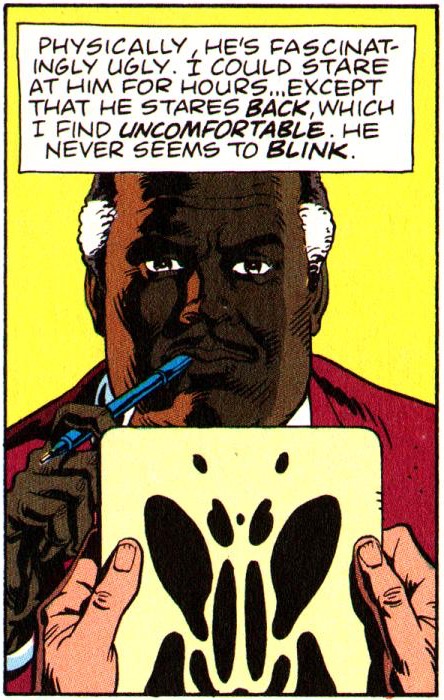 The fundamental problem at the heart of this is simply that Rorschach is an unsettlingly fascinating character. Even Moore, for all the reservations he would come to have about him, freely admits that “Rorschach was one of the characters I enjoyed writing most.” And no wonder – think of a classic line in Watchmen and the odds are overwhelming that you’re thinking of a Rorschach line, probably either a bit of his opening monologue or “none of you understand. I’m not locked up in here with you. You’re locked up in here with me.” Whether or not one relates to the character, he is undeniably compelling, reliably giving the book a jolt of energy whenever he shows up.
The fundamental problem at the heart of this is simply that Rorschach is an unsettlingly fascinating character. Even Moore, for all the reservations he would come to have about him, freely admits that “Rorschach was one of the characters I enjoyed writing most.” And no wonder – think of a classic line in Watchmen and the odds are overwhelming that you’re thinking of a Rorschach line, probably either a bit of his opening monologue or “none of you understand. I’m not locked up in here with you. You’re locked up in here with me.” Whether or not one relates to the character, he is undeniably compelling, reliably giving the book a jolt of energy whenever he shows up.
And Rorschach’s frightening glamor is essential to the book’s function. He is, after all, the hook upon which the first issue relies to draw the reader in. Watchmen is drenched in apocalyptic paranoia, but it is Rorschach’s Son of Sam-inspired mutterings about gutters full of blood and human cockroaches and dusks that reek of fornication and bad consciences that readers see first, and Rorschach’s single-minded quest for retribution in the face of armageddon that drives the initial investigation of the Comedian’s murder, even before it’s particularly clear who the Comedian was. If Rorschach were not single-handedly capable of captivating the reader’s attention Watchmen would simply never have worked on the first place. And while Moore, when asked if Rorschach is the protagonist, flatly says “No, I don’t think there is a center of the book,” the fact remains that Rorschach’s investigation, introduced at the start of the first issue and resolved in the last, forms the core of Watchmen’s plot.
But to truly understand Rorschach’s appeal one must first understand why it is that Moore was so attracted to him, at least at the time. This is not hard to surmise, of course. There are many moments where Rorschach is clearly held at some remove by the narrative and intended to be a troublesome figure. But when he proclaims his refusal to compromise “even in the face of armageddon,” you can just about hear the author punch the air in satisfied triumph. As Moore himself admits, “in many ways I’m like Rorschach, as the comics industry has probably learned to its dismay over time.” And indeed, it’s difficult to think of anyone in the industry with a deeper love of self-defeating moral stances than Alan Moore.

 |
| Figure 978: Steve Ditko in the 1970s, the most recent known photograph of him. |
Difficult, but not impossible. And the obvious figure to point to as analogous to Moore is the very man whose creations Rorschach was designed as a riff upon: Steve Ditko. Like Moore, Ditko was a fierce idealist prone to absolutist moral positions taken regardless of their consequences for his career. These positions ranged from landmark defenses of creator’s rights, such as when he demanded (and got) credit for plotting The Amazing Spider-Man, the first time that an artist got due credit for their role in a “Marvel Method” collaboration with Stan Lee, to the more than faintly ridiculous, such as his refusal to draw stories with vampires in them. Story after story of working with Steve Ditko highlights his eccentricity, whether it be calling Tom DeFalco demanding to know what gave him the right to write about heroes or rejecting a declaration from Stan Lee proclaiming him the co-creator of Spider-Man on the grounds that the word “considered” was too weak. Indeed, Ditko would even, like Moore, end up eschewing the money made from merchandising and film, albeit for very different reasons, namely that such profits weren’t part of the contracts under which he co-created Spider-Man, and so constituted an act of charity, which he abhorred.

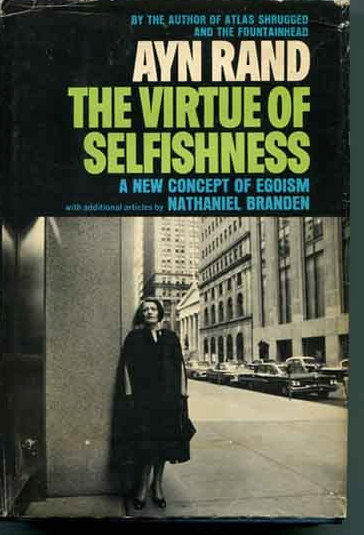 |
| Figure 979: Ayn Rand on the cover of The Virtue of Selfishness, released two years after the first appearance of Spider-Man. |
This last point may seem strange, but was entirely sincere, emerging out of his deep commitment to the philosophy of Russian-American novelist and pop philosopher Ayn Rand, whose philosophy of Objectivism openly despised altrusim (one of her books, published in 1964 right in the midst of Ditko’s Spider-Man run and as he was really getting into her work, was bluntly titled The Virtue of Selfishness). As a result of this, along with his refusal to sell his original art, also due to esoteric Objectivist principles, he’s spent the bulk of his life, as Moore puts it, “living in some very reduced circumstances,” which it’s clear Moore has a certain admiration for.
Actually, Moore’s admiration for Ditko runs quite deep. He recorded a song called “Mr. A” with his band The Emperors of Ice Cream,” speaks animatedly about the way in which Dr. Strange seemed to engage in magic by “imagining” things (a claim with marked similarities to both Moore and Blake’s visions of magic), and speaks with obvious relish when he recounts Ditko’s description of Rorschach as “like Mr. A, except he’s insane.” And Ditko’s influence on Watchmen extends well beyond just inspiring its most famous character. Moore got the entire nine-panel grid structure from Ditko, who rarely used it with the sharp rigidity of Watchmen, but who still regularly utilized it, which Moore claims “brought a kind of claustrophobia, a kind of paranoia to the work,” both moods that fit well with Watchmen’s apocalyptic inclinations.
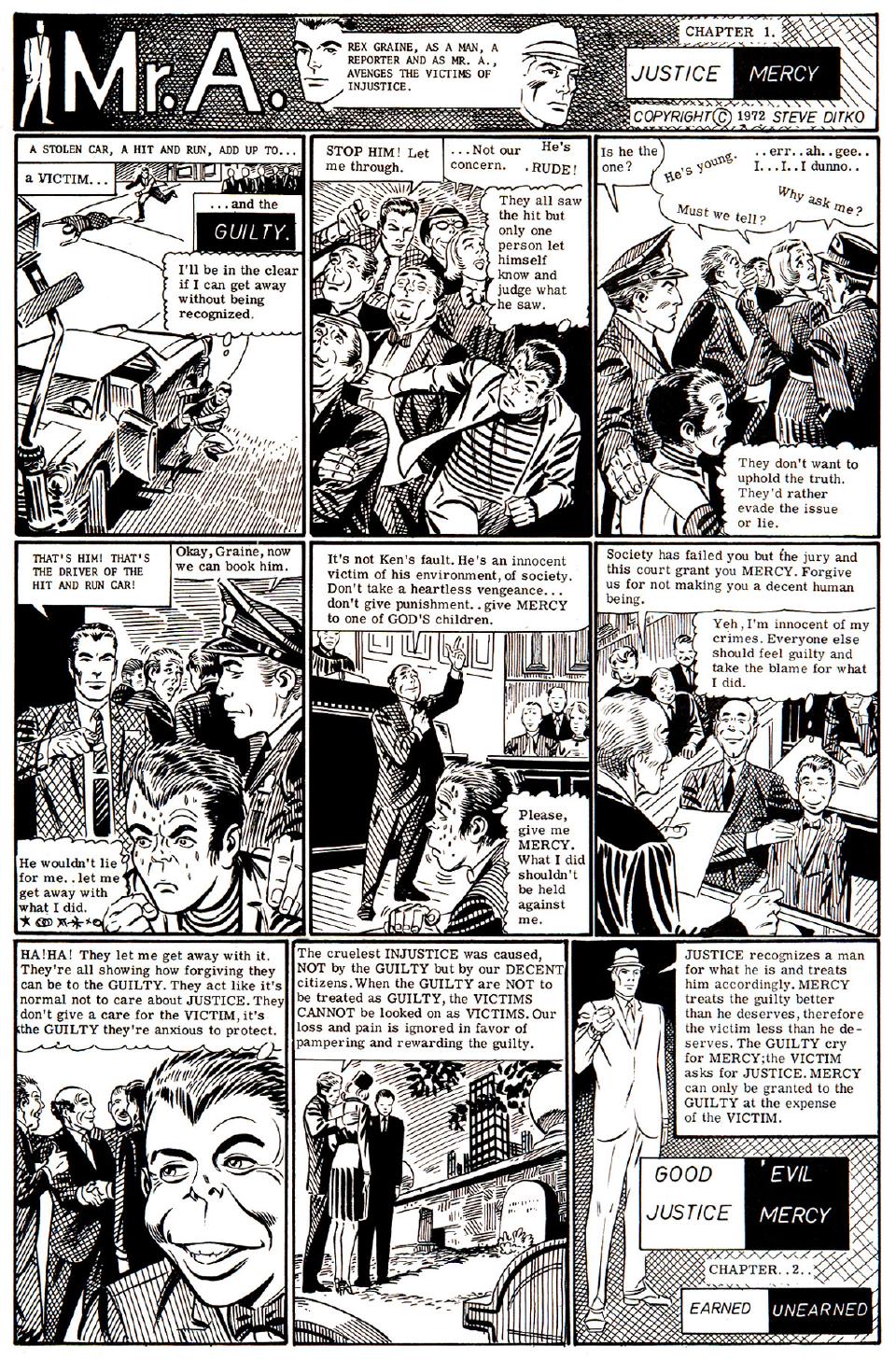 |
| Figure 980: A 1972 Mr. A strip using Ditko’s oft-relied upon nine-panel grid. |
Indeed, even Ditko’s politics formed an odd sort of appeal for Moore, who summed up the situation by noting that “Ditko had a political agenda, and that in some ways set him above most of his contemporaries,” even though he viewed Rand’s worldview as being little more than “white supremacist dreams of the master race.” But that Moore would take a viewpoint he found repulsive and give it to one of the characters who most directly reflected his inclinations is perhaps no surprise – Moore had, after all, already worked hard to make the outright fascists of V for Vendetta sympathetic and well-rounded characters. While he admired Ditko’s political agenda and moral purity, after all, he was decidedly uninterested in making the sort of didactically moralizing comics that Ditko made with Mr. A. Where Mr. A believed, as Moore put it (leaning forward towards the camera and into shadow, and adopting his best menacing growl) “there is white and there is black, and there is nothing in between,” Moore was almost exclusively interested in ambiguities.
 But in an odd way, Mr. A was right, and Moore proved unable to have his cake and eat it too. The fundamentally sympathetic nature of Rorschach makes it easy to forgive any given failing. Moore may snark about fans with bad hygiene and no girlfriends and include numerous little moments where these things are highlighted in the narrative to emphasize Rorschach’s troubled nature, but these are in turn visibly derived and exaggerated from Ditko’s life – his spartan lifestyle embellished into unsanitary squalor, the lack of sexuality in his work extrapolated to quasi-Freudian repression. And these are, in the end, the very things Moore loves and admires about him – the feverish vision and, as he puts it, “tormented elegance” of his art. And given this, Rorschach’s politics – a cynical pastiche of the extremes of the Republican (and for that matter Tory) Party essentially in the same vein as Roscoe Moscow – are all too easy to overlook, not least because they are in some regards rather more moderate than Ditko’s.
But in an odd way, Mr. A was right, and Moore proved unable to have his cake and eat it too. The fundamentally sympathetic nature of Rorschach makes it easy to forgive any given failing. Moore may snark about fans with bad hygiene and no girlfriends and include numerous little moments where these things are highlighted in the narrative to emphasize Rorschach’s troubled nature, but these are in turn visibly derived and exaggerated from Ditko’s life – his spartan lifestyle embellished into unsanitary squalor, the lack of sexuality in his work extrapolated to quasi-Freudian repression. And these are, in the end, the very things Moore loves and admires about him – the feverish vision and, as he puts it, “tormented elegance” of his art. And given this, Rorschach’s politics – a cynical pastiche of the extremes of the Republican (and for that matter Tory) Party essentially in the same vein as Roscoe Moscow – are all too easy to overlook, not least because they are in some regards rather more moderate than Ditko’s.
This is the crux of the problem with Rorschach; in the end, the sheer degree to which he’s a compelling character obscures everything else. No matter how many intricate details and subtly balanced ambiguities you stack up against it, “but I’ll look down and whisper no” or “you’re stuck in here with me” are going to feel larger. In a sense, it is the effect Watchmen has upon the history of the War in a microcosm, the raw and iconic impact of it obscuring the details. And so instead of a nuanced psychological portrait of a character who is at once noble and monstrous there is simply a couple of brilliant quotes and a sense of edgy nihilism.
The nihilism, presumably, is not what Rorschach’s right-wing admirers have in mind when they praise him. Indeed, while the spectacle of Rorschach’s embrace by far-right politicians is undeniably fascinating, and probably the most depressing aspect of Watchmen’s reception, it’s not the meat of it. It is not as though the throngs of adoring fans at comics conventions were all passionate Objectivists, after all. Rather it is the degree to which Rorschach’s major quotes offer a strange and unsettling variation on conventional superhero power fantasies where, instead of stylizing a conventional ethos of heroic American nationalism, it stylizes a brutally apocalyptic nihilism. As Rorschach explains, “existence is random. Has no pattern save what we imagine after staring at it for too long. No meaning save what we choose to impose.” And because of this, he is “free to scrawl own design on this morally blank world.” That this design is a tribute to Steve Ditko’s idiosyncratic politics is not, in most regards, the most important part of the picture.

 |
| Figure 981: Gibbons depicts one of Watchmen’s most brutal acts of violence as a relatively static scene, with Rorschach in a far from dynamic pose. (Written by Alan Moore, art by Dave Gibbons and John Higgins, from Watchmen #6, 1986) |
Nor, however, is the nihilism, despite the invocation of a classic Nietzsche quote and final note of Rorschach’s focus issue, “The Abyss Gazes Also.” Rorschach, after all, clearly does live in what he views as a meaningful world, even if its meaning is of his own design. But within that tension it’s really that last word – “design” – that sticks out. It is not just that Rorschach’s nihilism is intensely stylized – it’s that all of him is, right down to his superhero action, which is at once brutally violent and consciously understated. This is one of the first striking things about Rorschach, all the way back in the finger-breaking scene of the first issue, but it’s a common trope for Rorschach – the scene where he kills a prisoner with cooking fat, for instance, uses a triple-panel for the attack, but is still presented as a very simple action – one panel of Rorschach picking up the pan, and then the panel of him splashing it at his would-be attacker, Rorschach’s body language remaining tight and static, Gibbons making sure he remains the calm heart of a panel in which everybody else is panicking.
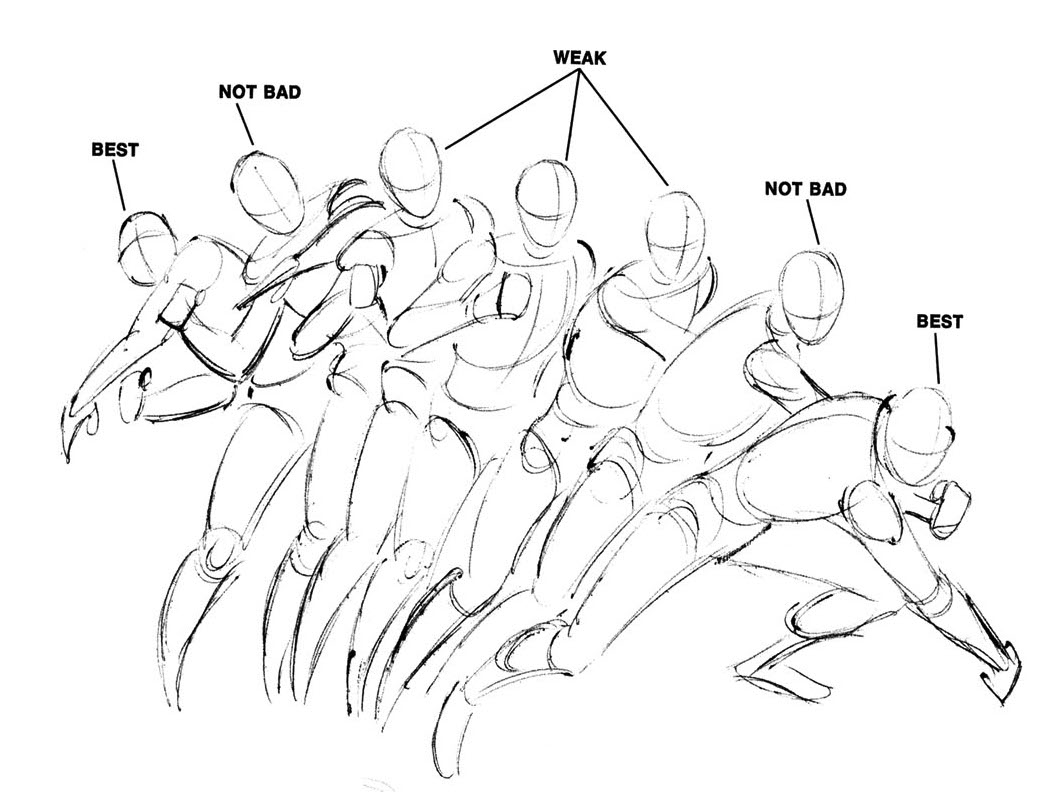 |
| Figure 982: John Buscema demonstrates the Marvel-authorized way to draw action poses. (From How to Draw Comics the Marvel Way, 1978) |
This decision, it has to be stressed, is in conscious and deliberate contrast to the traditional style of superhero action. Consider the advice given by Stan Lee and John Buscema in their famous guide book How to Draw Comics the Marvel Way, where Buscema provides a series of seven images of a figure in various stages of throwing a punch and Lee explains, “notice how the first drawing and the last one in that particular sequence seem to have the most impact – the most action. In a Marvel story, the artist would use either of those shots rather than the tamer ones in between.” But in the cooking fat panel Rorschach’s pose is clearly in the vein of the tamer ones – his spine is straight, and the arm throwing the pan of fat is minimally extended. More to the point, however, consider his victim, whois sprawling back, or the horrified prisoner behind him, both of whom are in the much more traditional action poses. In other words, it’s not just that Gibbons’s style for Watchmen is much tighter and focused on smaller movements than most superhero art. It’s true that he favors slightly “tamer” poses than Lee and Buscema recommend, but a perusal of the book’s action sequences will show that Gibbons draws the characters in striking, kinetic poses plenty of times. It’s only Rorschach that he reliably draws in a static, tightly controlled manner, constantly creating a gulf between the smallness of Rorschach’s movements and the devastating brutality of their consequences.
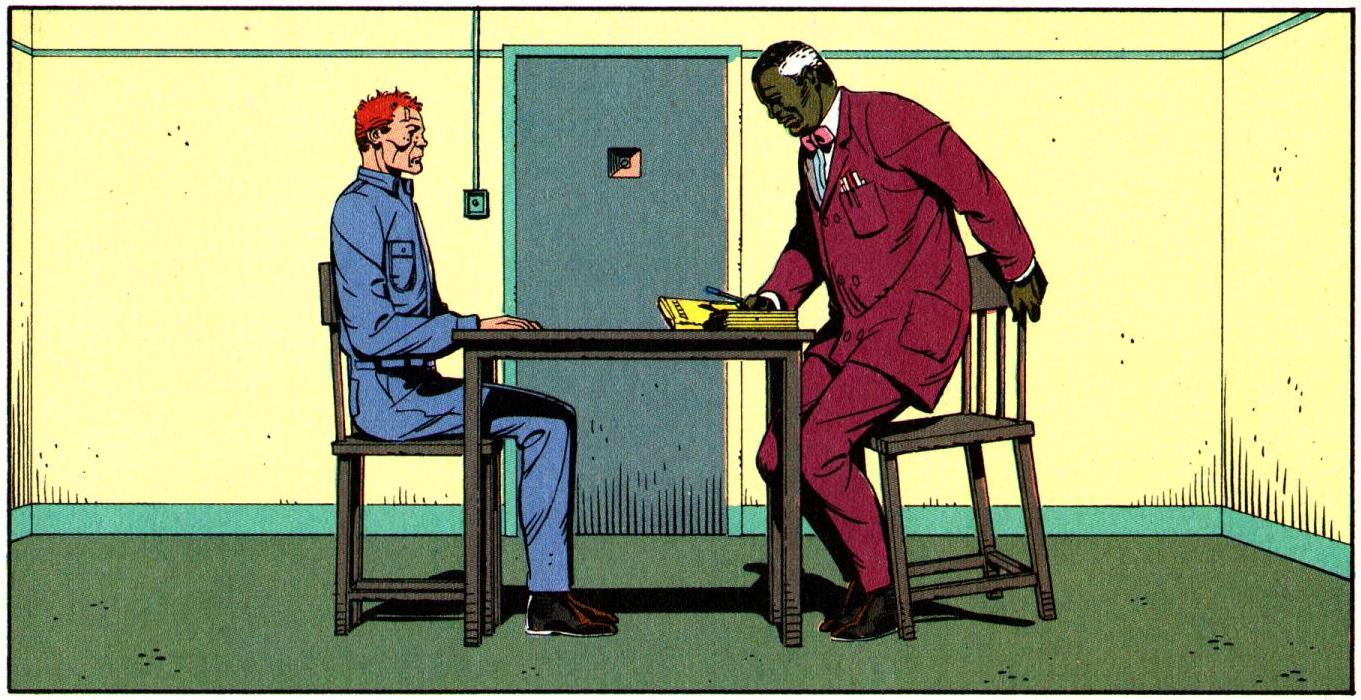 The result of this is to create a degree of distance between Rorschach and the reader, making him into an object of spectacle, to be observed and looked at. This is, of course, a theme in Watchmen at large (clue’s in the title, really), but it’s one with a special relationship to Rorschach, whose focus issue is one of two to have a reference to the act of looking in its title. But in some ways even more revealing is the approach the issue takes to its storytelling, revealing Rorschach from the perspective of his prison psychiatrist Malcolm Long, with the issue’s narration comprised of the notes from his sessions with Rorschach. This is a slightly strange move – Long is introduced purely to serve as the narrator for “The Abyss Gazes Also,” and while he makes a couple more appearances before dying in Ozmandias’s fake alien attack, he’s not really a major concern of the book anywhere outside of that chapter. More to the point, it’s not as though Rorschach’s perspective is otherwise absent from the story. Moore, in other words, goes to the unusual length of creating a new character just so that Rorschach’s focus chapter can take a more distant perspective on its subject than the book had previously been offering.
The result of this is to create a degree of distance between Rorschach and the reader, making him into an object of spectacle, to be observed and looked at. This is, of course, a theme in Watchmen at large (clue’s in the title, really), but it’s one with a special relationship to Rorschach, whose focus issue is one of two to have a reference to the act of looking in its title. But in some ways even more revealing is the approach the issue takes to its storytelling, revealing Rorschach from the perspective of his prison psychiatrist Malcolm Long, with the issue’s narration comprised of the notes from his sessions with Rorschach. This is a slightly strange move – Long is introduced purely to serve as the narrator for “The Abyss Gazes Also,” and while he makes a couple more appearances before dying in Ozmandias’s fake alien attack, he’s not really a major concern of the book anywhere outside of that chapter. More to the point, it’s not as though Rorschach’s perspective is otherwise absent from the story. Moore, in other words, goes to the unusual length of creating a new character just so that Rorschach’s focus chapter can take a more distant perspective on its subject than the book had previously been offering.
 A crucial part of why this works – and indeed why it’s necessary – is that Rorschach is an unreliable narrator who is disinclined to reveal important things about himself. For instance, Rorschach’s repeated unease with sexuality is a clear part of his character from the first issue, which includes a strange three-panel sequence in which he stands in an alley watching a couple kissing in a window above overlaid with narration from his journal. And, of course, there’s the odd bit about “good men like my father, or President Truman” in the famous opening monologue. In practice, as “The Abyss Gazes Also” reveals, all of this is the product of his abusive upbringing. It’s not that this isn’t alluded to elsewhere – he notes that his landlady “reminds me of my mother” in “Fearful Symmetry,” for instance – but it’s very much something that Rorschach would never bring up on his own.
A crucial part of why this works – and indeed why it’s necessary – is that Rorschach is an unreliable narrator who is disinclined to reveal important things about himself. For instance, Rorschach’s repeated unease with sexuality is a clear part of his character from the first issue, which includes a strange three-panel sequence in which he stands in an alley watching a couple kissing in a window above overlaid with narration from his journal. And, of course, there’s the odd bit about “good men like my father, or President Truman” in the famous opening monologue. In practice, as “The Abyss Gazes Also” reveals, all of this is the product of his abusive upbringing. It’s not that this isn’t alluded to elsewhere – he notes that his landlady “reminds me of my mother” in “Fearful Symmetry,” for instance – but it’s very much something that Rorschach would never bring up on his own.
 |
| Figure 983: Rorschach sees his mother in the ink blot. (Written by Alan Moore, art by Dave Gibbons and John Higgins, from Watchmen #6, 1986) |
But interestingly, it’s not actually Dr. Long that brings this information out. The nature of Rorschach’s mother is instead revealed via a flashback on Rorschach’s part as he looks at a Rorschach blot, with a pair of panel transitions between the blot to two silhouetted figures, first his mother and a client having sex, second his mother physically abusing him. But this is entirely internal – Rorschach’s subsequent account of what he sees, presented in humorous contrast to the two-page flashback that precedes it, is “some nice flowers.” This is not to say that Long is played as a hapless dupe through the issue – he’s aware of Rorschach’s background, and it’s from his notes that the reader learns that “in 1956, when informed of his mother’s brutal murder, he restricted his comments to one word: ‘Good.’” But he’s also not privileged over Rorschach’s own perspective. Indeed, Long clearly gets it wrong in places, such as when he declares “what we have here is a classic case of misdirected aggression. Kovacs hated his mother. After her death, he needed somewhere to put the anger, and so he chose the criminal fraternity. The flimsy story about Kitty Genovese is obviously there to justify his behavior to himself. It’s perfectly simple. Case solved.” What’s important, in other words, is simply that Long provides a second, external view on Rorschach, not that he provides an objective or reliable one to correct Rorschach’s own.

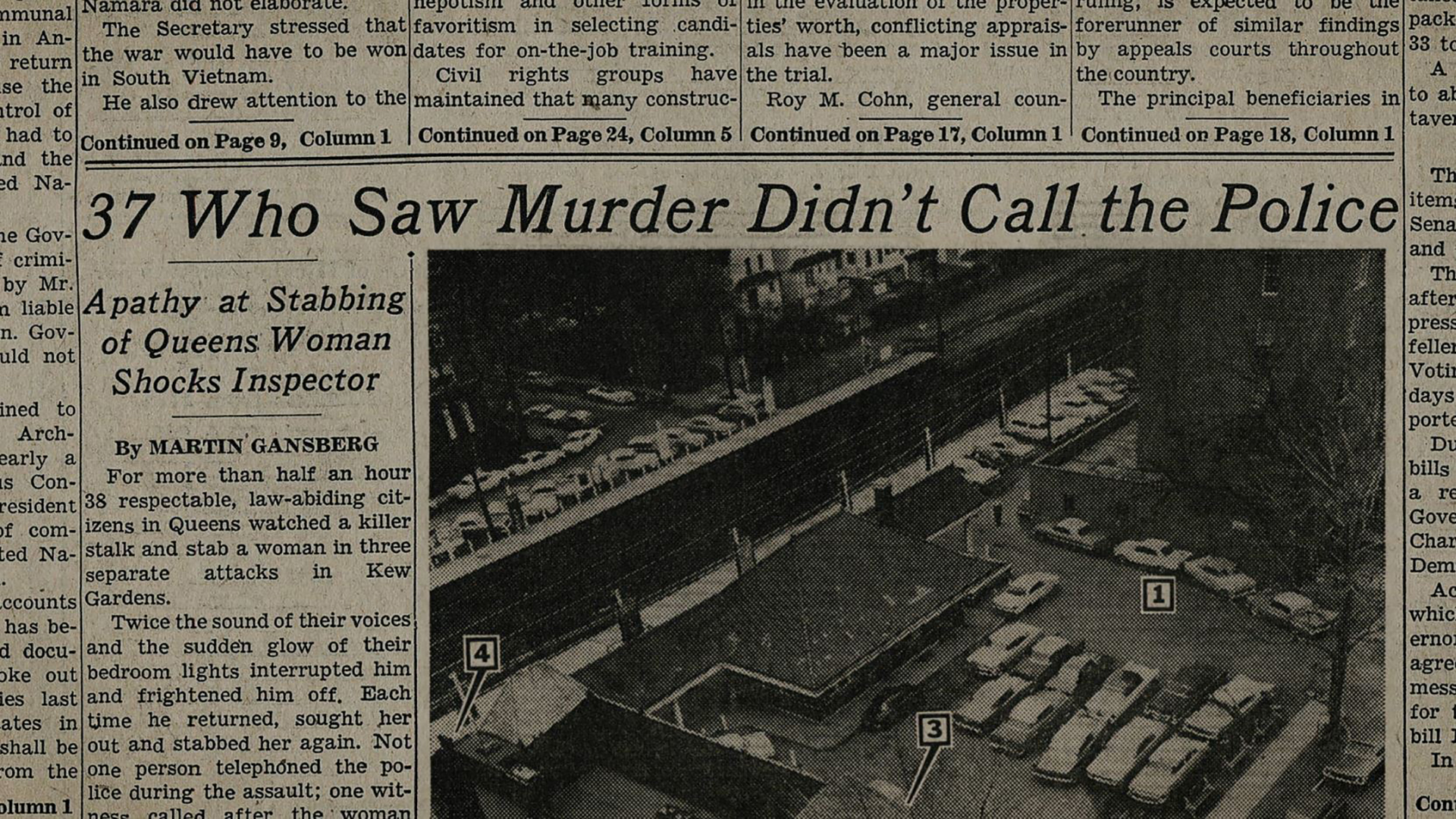 |
| Figure 984: The infamous New York Times headline reporting the death of Kitty Genovese. |
The invocation of Kitty Genovese adds yet another layer to the fractally dense theme of watching, and indeed adds more complexity than Moore could have realized at the time. Rorschach’s account of it to Dr. Long more or less sums up the popular account of her murder: “Kitty Genovese. Raped. Tortured. Killed. Here. In New York. Outside her own apartment building. Almost forty neighbors heard screens. Nobody did anything. Nobody called cops. Some of them even watched.” This account was basically established by the New York Times piece two weeks after her murder headlined “37 Who Saw Murder Didn’t Call the Police,” which in turn spawned a wealth of psychological research into what’s generally called the bystander effect, whereby the odds that someone will intervene actually decreases the more people are watching. The only problem is that in recent years it’s become clear that the New York Times account was hugely sensationalized. The overwhelming majority of the supposed witnesses only heard the commotion, and assumed it was a domestic dispute. In fact two neighbors did call the police, while another yelled at Genovese’s attacker, temporarily scaring him away, although he returned to finish the job. Another neighbor, Sophia Farrar, risked her life to come out of her apartment and hold Genovese as she died, a fact the Times simply declined to mention, much to Farrar’s horror and dismay.
Moore, of course, could not have known any of this – it emerged well after the publication of Watchmen. He was simply picking up on a famous historical incident and suturing it into the alternate history of Watchmen the same as many others, adding the detail that Genovese, two years before her murder, had placed a special order for a dress using a new fabric marketed under Dr. Manhattan’s name from a dressmaker that Walter Kovacs was working at, which he fashioned into his mask after her murder so that he could have “a face that I could bear to look at in the mirror.” But notably, Genovese was a sociable bon vivant active in New York’s pre-Stonewall gay scene, and so the detail of her special-ordering a dress made with an experimental Dr. Manhattan spin-off fabric, whether intentionally or not, is a rare case of invoking her name in a way that honors her life instead of the awful circumstances of her death.
 |
| Figure 985: Moore and Gibbons parallel Rorschach looking at Kitty Genovese’s dress and at the headline announcing her murder in two vertically consecutive panels. (Color by John Higgins, from Watchmen #6, 1986) |
But this post-publication detail that the entire popular understanding of Kitty Genovese is the product of journalistic sensationalism is I most regards just another level of complexity to the already ornate tangle of perspectives and gazes involved in this. For instance, Genovese rejects the dress after ordering it because she thought it “looked ugly,” an assessment Rorschach pointedly disagrees with. When Rorschach takes the dress home, he cuts the fabric until “it didn’t look like a woman anymore.” There’s a panel featuring the signature image of a POV shot of a character’s hands holding something, in this case Rorschach holding a paper with the headline “WOMAN KILLED WHILE NEIGHBORS LOOK ON,” a panel that also subtly undercuts Rorschach’s entire narrative as he insists “Kitty Genovese. I’m sure that was the woman’s name,” an insistence that only serves to raise the possibility that it isn’t. The phrase “some of them even watched” is repeated twice, both times over panels looking up at the apartment windows of Genovese’s complex at the people staring down at her murder. Rorschach wants a face he can “look at in the mirror,” while Dr. Long suggests that he’s “been conditioned with a negative world view.” And all of this occurs over just eleven panels.
More to the point, however, this isn’t even a particularly exceptional sequence. Watchmen is absolutely drenched in such references. To name just a few: Rorschach’s opening monologue (“I have seen its true face.”; “all the whores and politicians will look up and shout ‘save us!’ and I’ll look down and whisper ‘no.’”’; “the whole world stands on the brink, staring down into bloody hell.”); Veidt’s simultaneous viewing of television screens; Rorschach’s assertion that the Comedian “saw the true face of the twentieth century and chose to become a reflection, a parody of it”; Doctor Manhattan’s line that “all we ever see of stars are their old photographs”; the use of Night Owl’s goggles as a synecdoche of him (“no matter how black it got, when I looked through these goggles everything was as clear as day”); and the recurring “Who Watches the Watchmen” graffiti, especially in the way in which Moore and Gibbons contrive to always have the phrase unfinished or obscured. Also the title.
 But for all the density of this theme, Rorschach’s perspective is not lost in the mix. Its gravity is inescapable, trapping all the other perspectives within its all-encompassing and visionary gaze even as they try desperately to gain perspective on him. It is a genuinely uncanny power – one that goes beyond the merely compelling nature of his prose or the myriad of good lines he gets, beyond the content of his worldview, beyond Moore’s intentions, and ultimately beyond anything that could even be called Rorschach’s intentions. In this sense, it is slightly inaccurate to even call him a character. He is what Morrison would term a hypersigil – an artistic creation worked so finely that it attains a will and gravity of its own – that it becomes magic.
But for all the density of this theme, Rorschach’s perspective is not lost in the mix. Its gravity is inescapable, trapping all the other perspectives within its all-encompassing and visionary gaze even as they try desperately to gain perspective on him. It is a genuinely uncanny power – one that goes beyond the merely compelling nature of his prose or the myriad of good lines he gets, beyond the content of his worldview, beyond Moore’s intentions, and ultimately beyond anything that could even be called Rorschach’s intentions. In this sense, it is slightly inaccurate to even call him a character. He is what Morrison would term a hypersigil – an artistic creation worked so finely that it attains a will and gravity of its own – that it becomes magic.
 It is perhaps this mystical excess that leads to one of the strange and oft-unacknowledged realities of Watchmen, which is that Rorschach’s focus issue, “The Abyss Gazes Also,” is in most regards a hot mess. Yes, it has numerous brilliant individual moments: “I’m not locked up in here with you. You’re locked up in here with me.”; “We do it because we are compelled.”; “Sweltering bloodstain on chest like map of violent new continent.”; and even a few past that. But the issue relies on the sheer punch of these moments to obscure the fact that it’s alternately sloppy and lazy. Much of Grant Morrison’s complaint that Moore “refused to allow any of his creations to be smarter than he was, so the pacifist genius became a genocidal idiot; the confident trained psychiatrist was reduced to a gibbering wreck by the darkness in the soul of his patient; the detectives stumbled through the plot to their doom; and even the more or less divine superhuman was shown to be emotionally retarded an ineffectual” is drastically overstated, but the truth is that a prison psychiatrist in New York City being shocked into brutal nihilism by the fact that a guy killed a six-year-old girl and fed her to his dogs is deeply contrived. The moment just about works as the thing that sends Rorschach over the edge, but that’s largely due to the idiosyncrasies of his personal psychology that the issue goes to some length to establish. The idea that Dr. Long hasn’t heard similarly awful stories over the course of his training and career, on the other hand, is as ridiculous as Morrison suggests.
It is perhaps this mystical excess that leads to one of the strange and oft-unacknowledged realities of Watchmen, which is that Rorschach’s focus issue, “The Abyss Gazes Also,” is in most regards a hot mess. Yes, it has numerous brilliant individual moments: “I’m not locked up in here with you. You’re locked up in here with me.”; “We do it because we are compelled.”; “Sweltering bloodstain on chest like map of violent new continent.”; and even a few past that. But the issue relies on the sheer punch of these moments to obscure the fact that it’s alternately sloppy and lazy. Much of Grant Morrison’s complaint that Moore “refused to allow any of his creations to be smarter than he was, so the pacifist genius became a genocidal idiot; the confident trained psychiatrist was reduced to a gibbering wreck by the darkness in the soul of his patient; the detectives stumbled through the plot to their doom; and even the more or less divine superhuman was shown to be emotionally retarded an ineffectual” is drastically overstated, but the truth is that a prison psychiatrist in New York City being shocked into brutal nihilism by the fact that a guy killed a six-year-old girl and fed her to his dogs is deeply contrived. The moment just about works as the thing that sends Rorschach over the edge, but that’s largely due to the idiosyncrasies of his personal psychology that the issue goes to some length to establish. The idea that Dr. Long hasn’t heard similarly awful stories over the course of his training and career, on the other hand, is as ridiculous as Morrison suggests.
_(comichost-dcp)_p020.jpg) |
| Figure 986: Gloria’s other appearance in Watchmen establishes her as a deeply unpleasant character. (Written by Alan Moore, art by Dave Gibbons and John Higgins, from Watchmen #11, 1986 |
But this isn’t even the only weak spot in the issue. The basic framework of Rorschach looking at Rorschach blots is a strange and deeply unsatisfying case of Moore going with the single most obvious idea, made all the weirder by the complete failure of Dr. Long to ever give any thought to whether this might affect the suitability of the test as a diagnostic tool in this case. Similarly absurd and contrived is the basic idea of a respected psychiatrist believing that ta violent killer with extreme dissociation could be cured if only he believed in the existence of good people. There’s also weird gaps like Long’s wife, Gloria angrily protesting “remember last night, Mal? When I required attention?” when the timeline of the issue makes it very clear that in fact the Longs did have sex the previous night, a moment that is either a pretty basic bit of flubbed plotting or a deeply unpleasant stereotype about a sexually insatiable woman of color. (The latter possibility, frustratingly, really can’t be ruled out given how she’s portrayed in issue #11, her only other appearance in the series.) It is as though Rorschach is the one bit of Watchmen even Moore can’t quite figure out how to write about, even as he again and again makes him rivetingly compelling.

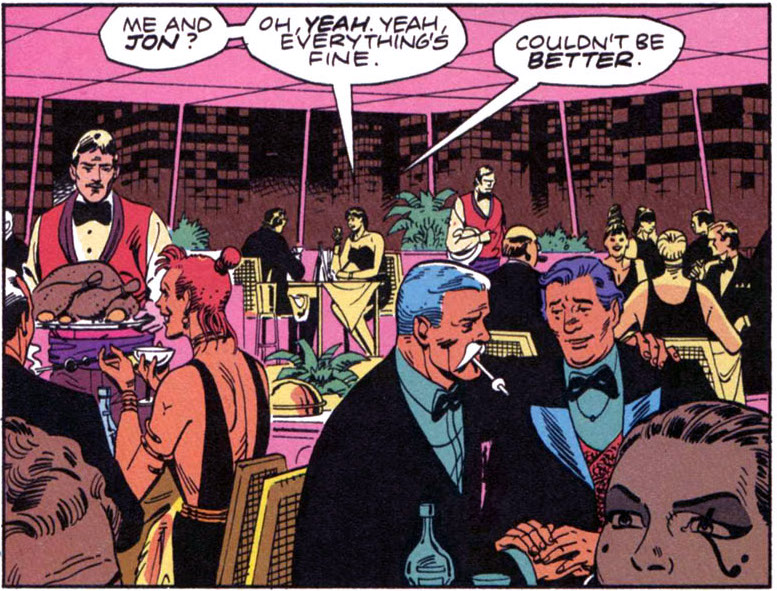 |
| Figure 987: The couple in the foreground is theorized by some readers to be a secretly still alive Hooded Justice and Captain Metropolis. (Written by Alan Moore, art by Dave Gibbons and John Higgins, from Watchmen #1, 1986) |
It is not that Moore doesn’t understand Rorschach. Watchmen is too meticulously deliberate a work to seriously justify any sort of claim that there are large-scale unintended meanings in the work. Stray implications like the resemblance between the couple in the restaurant in the first issue and Hooded Justice and Captain Metropolis will inevitably crop up, yes, but the idea that Rorschach has some secret motivation unbeknownst to his writer is implausible. Rorschach’s actual nature is firmly and intentionally within the text. But it is strangely underplayed, given how essential he is to the work’s basic structure – a vital point, arguably the beating heart of the work, that’s left entirely to subtext.
Perhaps the most important thing about Rorschach is what drew Moore himself to the character: he is unique among the six main characters of Watchmen in that his motivation for being a superhero is entirely based on morality. That is not to say that the other characters are amoral – all of them express clear moral principles at one point or another. But these morals aren’t, at the end of the day, why they put on costumes and fight crime. Night Owl, ultimately, is driven by a sort of fetishism – Ozymandias by a sense of grandeur and ambition. But as Moore puts it, at his core “everything in Rorschach’s world is seen in fiercely moral black and white terms.” The specific phrase “black and white” is of course part of the debt to Ditko’s Mr. A, and one that’s explicitly referenced in Watchmen when Rorschach explains why he didn’t think the dress Genovese ordered was ugly: “black and white moving. Changing shape… but not mixing. No gray.”

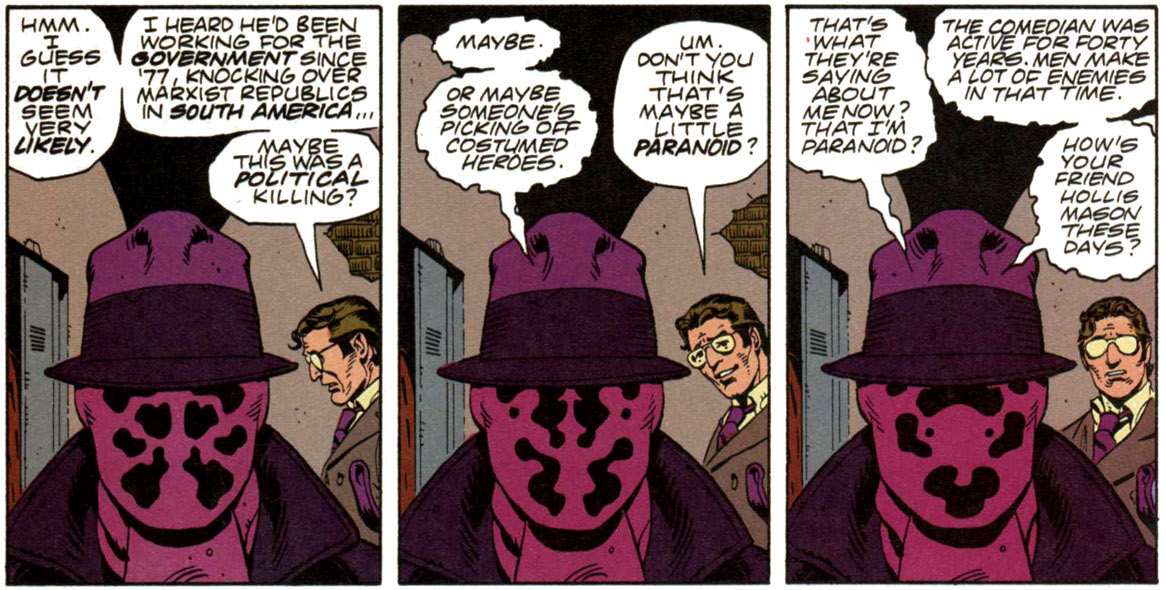 |
| Figure 988: Teaching the rules of Rorschach’s mask. (Written by Alan Moore, art by Dave Gibbons and John Higgins, from Watchmen #1, 1986) |
It’s easy to overlook how strange this image is, however. On the one hand there is Ditko’s classic rejection of moral ambiguity. But on the other there is a sense of constant fluidity. There is always an absolute line between good and evil, but its actual position is in constant flux. And this is a key and famous part of Rorschach’s design: the pattern on his mask changes every time Gibbons draws him. More than that, Moore goes out of his way to emphasize this in the first issue, having Gibbons draw a three-panel row with a fixed, head-on view of Rorschach as he converses with Dreiberg so that his mask is foregrounded, forcing the reader to notice this aspect of his character.
On a superficial level this would seem to undermine a great deal of Rorschach’s self-mythology. After all, how can a variable morality be absolute except in a hazily defined way that’s more bluster than content? And there are certainly ways in which this is supported. One can easily read Rorschach’s apocalyptic grandeur and brutal violence as little more than a performative bravado to mask the fact that his morality is capricious and bankrupt. This is especially vividly supported when Rorschach expresses admiration for the Comedian, saying that was “uncompromising. Admired that. Of us all, he understood most. About world. About people. About society and what’s happening to it. Things everyone knows in gut. Things everyone too scared to face, too polite to talk about. He understood. Understood man’s capacity for horrors and never quit. Saw the world’s black underbelly and never surrendered.” Rorschach simply stops short of the Comedian’s mocking nihilism, to his detriment, and his legions of unironic admirers simply fail to get Moore’s joke.
 But like Dr. Long’s various diagnoses of Rorschach, this reading is as unsatisfying as it is neat and tidy. Certainly Moore rejects it when he talks about Rorschach’s fiercely moral character. And more to the point Watchmen at large rejects it when it positions Rorschach as the sole possible alternative to Ozymandias’s triumph, a resolution that would have to be read as a near-unambiguous endorsement of Ozymandias’s plan if Rorschach’s morality were that easily dismissed. Clearly this is not what’s going on.
But like Dr. Long’s various diagnoses of Rorschach, this reading is as unsatisfying as it is neat and tidy. Certainly Moore rejects it when he talks about Rorschach’s fiercely moral character. And more to the point Watchmen at large rejects it when it positions Rorschach as the sole possible alternative to Ozymandias’s triumph, a resolution that would have to be read as a near-unambiguous endorsement of Ozymandias’s plan if Rorschach’s morality were that easily dismissed. Clearly this is not what’s going on.
 |
| Figure 989: Rorschach’s unexpectedly unchanging mask. (Written by Alan Moore, art by Dave Gibbons and John Higgins, from Watchmen #12, 1987) |
Given this, it is worth reflecting on the one case in which the rule about Rorschach’s mask is not followed – a four panel sequence in the final issue during which all of the other characters, one by one, decide that they’re going to go along with Ozymandias’s plan after all and not expose him. As with the three-panel sequence in the first issue that ensures the reader notices that Rorschach’s mask is always changing, it’s framed as a series head-on panels, this time steadily zooming in on Rorschach’s face as, one by one, the other characters, arranged in front of him so that with each zoom a new one is moved to the front of the image, cave in their moral principles, until finally, in the fourth panel, there is only Rorschach, responding to all of them with a simple “joking, of course.” And in all four panels, his mask takes the same pattern. More than that, it’s also the same design that appeared in the first issue for the panel where he says, “even in the face of armageddon I shall not compromise,” a line he reiterates as he walks out on the other characters after they decide to side with Ozymandias. (This is one of only two mask designs to recur anywhere in the series.)
 In other words, it’s clear that Watchmen and Moore have no problem with the basic idea of a morality that is at once absolute and changeable. Strictly in terms of Moore one might describe this, without any cynicism, as a con man’s morality, less a system of ethics than an aesthetic of fairness. But there is a better way of framing it, namely as a visionary morality. Blake is of course an obvious point of reference here, with his complex and ever-shifting pantheon and single-minded opposition to the very idea of single-mindedness. But the more salient point is simply the already remarked upon phenomenon of individual perspective. Rorschach’s morality is absolute in spite of its mutability because it is, in the end, anchored in the inescapably compelling phenomenon of Rorschach. It is not the single vision of Mr. A, a morality rooted in the crashingly didactic Ayn Rand obsession of his creator, but rather singular vision – not just in the sense of being tied to an ultimately irreplaceable individual’s perspective but in the sense of a singularity, a conceptual event of such weight that its influence is utterly inescapable.
In other words, it’s clear that Watchmen and Moore have no problem with the basic idea of a morality that is at once absolute and changeable. Strictly in terms of Moore one might describe this, without any cynicism, as a con man’s morality, less a system of ethics than an aesthetic of fairness. But there is a better way of framing it, namely as a visionary morality. Blake is of course an obvious point of reference here, with his complex and ever-shifting pantheon and single-minded opposition to the very idea of single-mindedness. But the more salient point is simply the already remarked upon phenomenon of individual perspective. Rorschach’s morality is absolute in spite of its mutability because it is, in the end, anchored in the inescapably compelling phenomenon of Rorschach. It is not the single vision of Mr. A, a morality rooted in the crashingly didactic Ayn Rand obsession of his creator, but rather singular vision – not just in the sense of being tied to an ultimately irreplaceable individual’s perspective but in the sense of a singularity, a conceptual event of such weight that its influence is utterly inescapable.
_(1987)_(comichost-dcp)_p009.jpg) |
| Figure 990: Rorschach’s speech bubbles change to their characteristically crumpled form when he puts his mask on. (Written by Alan Moore, art by Dave Gibbons and John Higgins, from Watchmen #10, 1986) |
 It is notable that such a singular event exists for Rorschach in the form of the Roche case, which he presents to Dr. Long as the revelatory moment that served as his true transformation into Rorschach. And the comic gives this claim credence beyond Rorschach’s say-so. After his transformation, his speech bubbles take on their characteristic “crumpled” form, which are not used in the chronologically earlier flashback to the Crimebusters meeting in issue #2. Although he doesn’t speak prior to that in the Roche flashback, making it impossible to firmly nail down this transformation, the transformation of Rorschach’s speech patterns when he puts on the mask is emphasized in issue #10 when he finally reclaims his mask and his speech bubble shifts as he puts it back on. So the fact that he speaks normally in the one scene in the comic that’s set prior to the Roche case and wearing his mask is, at the very least, suggestive.
It is notable that such a singular event exists for Rorschach in the form of the Roche case, which he presents to Dr. Long as the revelatory moment that served as his true transformation into Rorschach. And the comic gives this claim credence beyond Rorschach’s say-so. After his transformation, his speech bubbles take on their characteristic “crumpled” form, which are not used in the chronologically earlier flashback to the Crimebusters meeting in issue #2. Although he doesn’t speak prior to that in the Roche flashback, making it impossible to firmly nail down this transformation, the transformation of Rorschach’s speech patterns when he puts on the mask is emphasized in issue #10 when he finally reclaims his mask and his speech bubble shifts as he puts it back on. So the fact that he speaks normally in the one scene in the comic that’s set prior to the Roche case and wearing his mask is, at the very least, suggestive.
And while the degree to which the Roche case shatters Dr. Long’s illusions about the world is hard to credit, it’s not nearly as difficult to see why it matters so much to Rorschach. He explains as much when first describing it to Long: “Thought of little child, abused, frightened. Didn’t like it. Personal reasons.” And the personal reasons, given Rorschach’s own background as an abused child, are fairly self-evident. Indeed, this is a fairly consistent character trait for Rorschach – in issue #10 he is unexpectedly merciful to his former landlady, who he’d previously railed against on several occasions, in part because she reminded him of his mother, and who subsequently slandered him in the press after his arrest by claiming he made a pass at her. Initially he seems set to hurt or kill her, menacing her so severely that Night Owl begs him to back off, but he only does after she responds to him calling her a whore by saying “Oh please, don’t say that. Not in front of my kids… Please. They… they don’t know,” which is followed by a panel of Rorschach looking down at one of her crying, terrified children sadly before deciding to leave without incident.

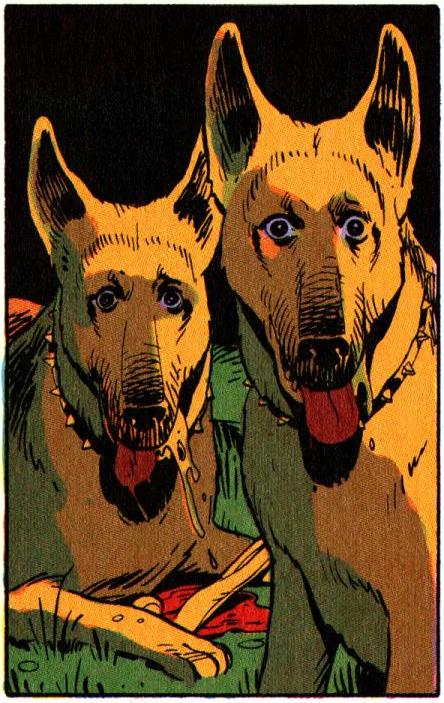 |
| Figure 991: Nice puppies. (Written by Alan Moore, art by Dave Gibbons and John Higgins, from Watchmen #6, 1986) |
What’s interesting, however, is the aspect of the case that Rorschach apparently fixates on – the killing of the dogs. That’s the moment he sees in the Rorschach blot, and the specific moment he highlights as his transformation. This is in marked contrast to the subsequent killing of Gerald Grice, the kidnapper, even though Long notes that Rorschach only started killing criminals in 1975, i.e. the year of the Roche kidnapping. There are not really any specific threads to pull on regarding Rorschach and his view of animals (although it is worth noting that the importance of the dead dog to Rorschach puts the first line of Watchmen and the relationship between a dog carcass and New York City’s true face into a new light, and, for that matter, the fact that Grant Morrison suggests that Moore chatted to him about converting to vegetarianism some time around this period), but all the same, it seems significant that the dogs had no real moral culpability in what happened. Gibbons even emphasizes this in the handful of panels between Rorschach’s realization of what’s actually going on (the other repeating mask design, matching the one when he discovers the Comedian’s costume in the first issue and Jacobi’s body in the fifth), having the panel of the two dogs just before Rorschach brings the cleaver down on them be of them wide-eyed, tongues out, looking decidedly non-aggressive.
It’s also worth highlighting the detail that the kidnapper had erred, thinking he was kidnapping a member of a wealthy family when in fact Blaire Roche’s father was a bus driver. The capricious nature of the murder – the fact that Roche died for nothing whatsoever – is crucial to Rorschach’s eventual declaration that “existence is random. Has no pattern save what we imagine after staring at it for too long,” hence his specific note that “it is not God who kills the children. Not fate that butchers them or destiny that feeds them to the dogs. It’s us. Only us.” And in the face of this unfathomable cruelty, Rorschach concludes that justice requires killing the dogs, not out of any straightforward logic, but out of a sort of raw aesthetic instinct. And it is realizing the depths of this instinct and its response to horrors like Blaire Roche’s murder that constitutes his realization of what being Rorschach really means.

 |
| Figure 992: Moore opts to undersell one of Rorschach’s best lines by putting it in a panel dominated by a coffeepot. (Art by Dave Gibbons and John Higgins, from Watchmen #6, 1986) |
It is worth looking at the specific moment in detail, however. The flashback pauses after the panel of Rorschach holding up the meat cleaver, with a cut to the Rorschach blot that Rorschach saw the dog’s head in serving in place of the actual image. Meanwhile, after nearly three pages of events being depicted silently, Rorschach’s narration returns: “Shock of impact ran along my arm. Jet of warmth splattered on chest, like hot faucet. It was Kovacs who said ‘mother’ then, muffled under latex. It was Kovacs who closed his eyes. It was Rorschach who opened them again.” On one level, this is simply dramatic effectiveness. The actual transformation of Kovacs into Rorschach is such an internal, psychological moment that it can’t be depicted directly, consisting of little more than a blink behind a mask. Navigating this sort of thing is one of Moore’s great skills in Watchmen after all – consider the way in which the famous “you’re locked up in here with me” line is tossed in a panel of Dr. Long reaching for a pot of coffee, as opposed to in a panel showing Rorschach getting dragged away by the guards.
 But what really stands out is once again the way in which Rorschach is depicted as being fundamentally inconsistent, this time in his whispered reaction to what he has done: “mother.” This moment doesn’t undermine Rorschach’s numerous other statements about his mother in some banal “he doesn’t really hate her” way. He is unquestionably an abuse victim, and carries the deep scars one would expect from that. But it does highlight the degree to which Rorschach’s status as an unreliable narrator cuts to the core of who he is. It’s not just a matter ofthings like him telling Dr. Long that “Kovacs had friends… not Rorschach. Not Rorschach at all,” but later and quite movingly telling Dan that he’s a good friend and apologizing for making things difficult. It’s that at his heart he is both a character driven by his hatred of his mother and one who, in a moment of deep existential crisis, instinctively turns towards her.
But what really stands out is once again the way in which Rorschach is depicted as being fundamentally inconsistent, this time in his whispered reaction to what he has done: “mother.” This moment doesn’t undermine Rorschach’s numerous other statements about his mother in some banal “he doesn’t really hate her” way. He is unquestionably an abuse victim, and carries the deep scars one would expect from that. But it does highlight the degree to which Rorschach’s status as an unreliable narrator cuts to the core of who he is. It’s not just a matter ofthings like him telling Dr. Long that “Kovacs had friends… not Rorschach. Not Rorschach at all,” but later and quite movingly telling Dan that he’s a good friend and apologizing for making things difficult. It’s that at his heart he is both a character driven by his hatred of his mother and one who, in a moment of deep existential crisis, instinctively turns towards her.
All of this just serves to point at the biggest and most fundamental inconsistency in Rorschach across the course of Watchmen, however: his final stand against Ozymandias’s plan. Because for all that this is portrayed as his great moment of uncompromising consistency, complete with the zoom in on his unchanging mask, it is at its heart a rejection of the single most iconic Rorschach moment in the entire comic. In the end, when armageddon comes and the streets and gutters of New York fill with blood, not only does Rorschach try to save them, he is literally the only person in the comic not to look down and whisper no.
 This, then, is the basic thing Rorschach fails to recognize about himself. He believes himself to be a figure of uncompromising judgment. He believes himself to be cruel and unforgiving. He believes himself, in other words, to be exactly the sort of person Ted Cruz would name as his favorite superhero. To be exactly the person that every crashing bore of a fan to proclaim himself to be just like Rorschach thinks they are like; to be everything that the comics industry would spend decades disastrously and slavishly copying out of Watchmen to be what even Moore himself came to mistake him for. When the truth is simpler, at once beautiful and in its own way more terrifying: he is not a figure of Severity, but of Mercy.
This, then, is the basic thing Rorschach fails to recognize about himself. He believes himself to be a figure of uncompromising judgment. He believes himself to be cruel and unforgiving. He believes himself, in other words, to be exactly the sort of person Ted Cruz would name as his favorite superhero. To be exactly the person that every crashing bore of a fan to proclaim himself to be just like Rorschach thinks they are like; to be everything that the comics industry would spend decades disastrously and slavishly copying out of Watchmen to be what even Moore himself came to mistake him for. When the truth is simpler, at once beautiful and in its own way more terrifying: he is not a figure of Severity, but of Mercy.
“Hello from the gutters of N.Y.C. which are filled with dog manure, vomit, stale wine, urine and blood. Hello from the sewers of N.Y.C. which swallow up these delicacies when they are washed away by the sweeper trucks. Hello from the cracks in the sidewalks of N.Y.C. and from the ants that dwell in these cracks and feed in the dried blood of the dead that has settled into the cracks.” -David Berkowitz

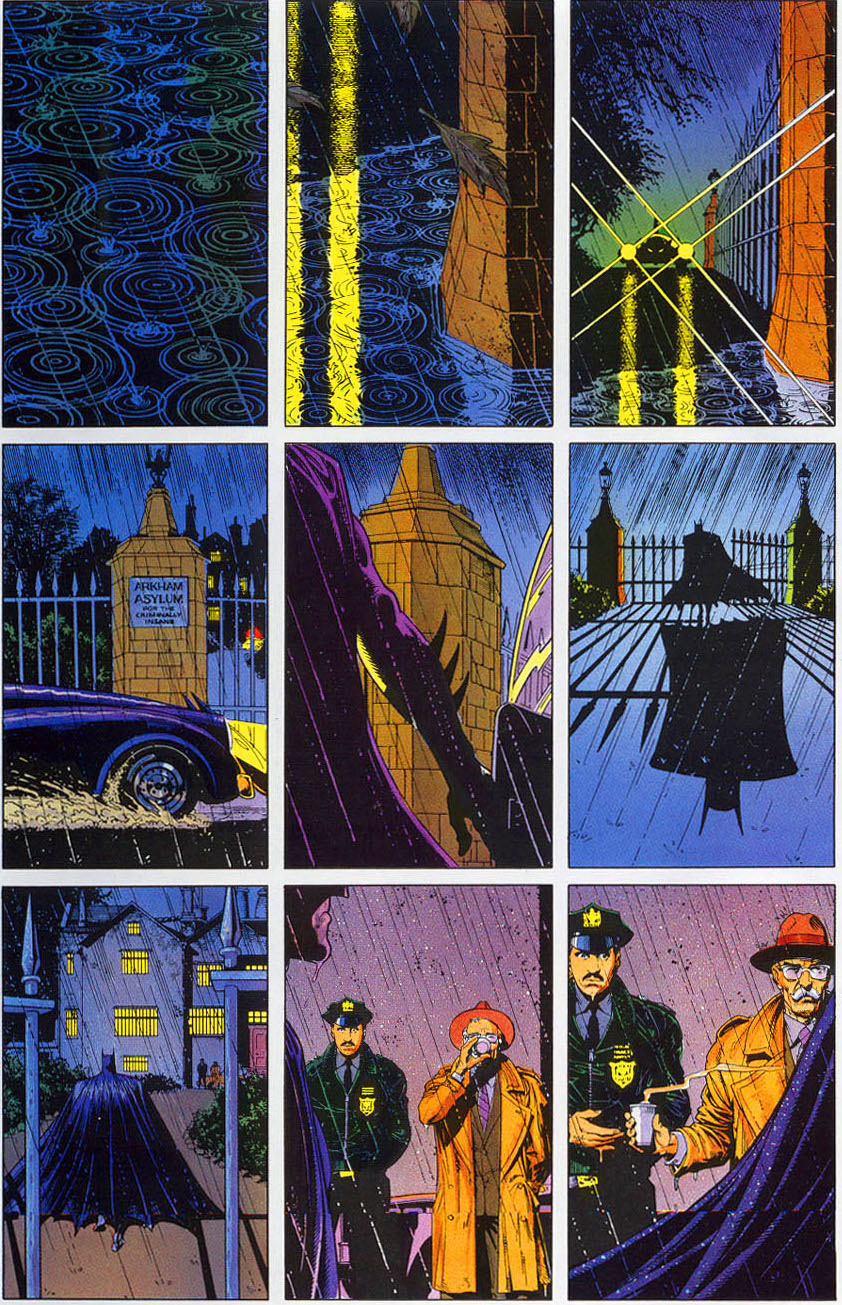 |
| Figure 993: The nine-panel grid opening of Batman: The Killing Joke. (Written by Alan Moore, art by Brian Bolland and John Higgins, 1988) |
{It is easy to read Batman: The Killing Joke as a follow-up to Watchmen, not least as came out a year later. The similarities abound: its opening adheres to the same tight nine-panel grid of Watchmen; the Joker and Batman’s conversation in an asylum echos the famous sequence of Rorschach in a mental institution; the Joker’s account of his creation as stemming from “the inescapable fact that human existence is mad, random and pointless” is a clear analogue to Rorschach’s declaration that “existence is random. Has no pattern save what we imagine after staring at it for too long.” Moore himself compares them, recalling that “I wrote it while I was writing Watchmen, or just after,” and a bit later in the same interview clearly coming to the conclusion that was “after,” saying that he “was bringing the same storytelling approach to Batman as I had for Watchmen. I was also bringing the same kind of quite grim, moral sensibility.”
Moore’s difficulties with chronology, however, are playing up; despite its position as one of Moore’s last two works at DC, followed only by the long-awaited conclusion of V for Vendetta, it was written considerably earlier in his five-year active stint at the company. The basic idea of Moore collaborating with Brian Bolland on a Batman project dates back to his very earliest days at DC. The initial idea had been a Batman/Judge Dredd crossover, but this was scuppered due to IPC and DC being unable to get along. Eventually, however, the project morphed to a straightforward Batman/Joker project, with Bolland being particularly keen to draw the Joker, who he viewed as a sort of visual cousin of Judge Death. As Bolland was tied up with Camelot 3000 until the end of 1984 anyway, the wheels couldn’t have properly started turning for what became The Killing Joke until the beginning of 1985, providing an earliest possible date for Moore to write the script.
As for a latest possible date, the physical script provides a key clue – its typesetting is erratic, meaning that Moore wrote it on his manual typewriter. This places it before Swamp Thing #51, the script of which opens with a paragraph of jokes about his new electric typewriter, which he alternately describes as a “vibrant and purring brute” and a “surly, unreliable cybernetic horror.” That issue came out in May of 1986, and so must have been scripted a couple months earlier. Broadly speaking, then, the script was most likely written sometime in 1985, a date that’s further supported by Denny O’Neil, who recalls that when he took over editing the project from Len Wein after Wein left DC in 1986 that the script “had been in house for a year.” So, in terms of his overall career, later than Book Two of Halo Jones, but well before “Whatever Happened to the Man of Tomorrow.”
This puts The Killing Joke during the development for Watchmen, but not very far into it. In particular, given that Moore wrote the script for the first issue of Watchmen in March of 1985 and Gibbons finished drawing it in June, it seems virtually impossible that The Killing Joke was actually written after “The Abyss Gazes Also,” the issue of Watchmen to which it bears the most obvious resemblance. And so while the similarities are not a coincidence, Watchmen is the later work, The Killing Joke the rough draft.
This is unsurprising, given that nobody worth taking seriously would ever call The Killing Joke a superior work. Indeed, even Bolland and Moore have taken to slagging off the work in recent years. Bolland notes that “the end result wasn’t quite what I’d hoped,” whereas Moore, while always taking care to stress that the problem is with his writing and not with Bolland’s art, rips the story for being “clumsy, misjudged, and [having] no real human importance.” His specific complaint, as he puts it, is that “at the end of the day The Killing Joke is a story about Batman and the Joker; it isn’t about anything that you’re ever going to encounter in real life, because Batman and the Joker are not like any human beings that have ever lived… it was just about a couple of licensed DC characters that didn’t really relate to the real world in any way.”
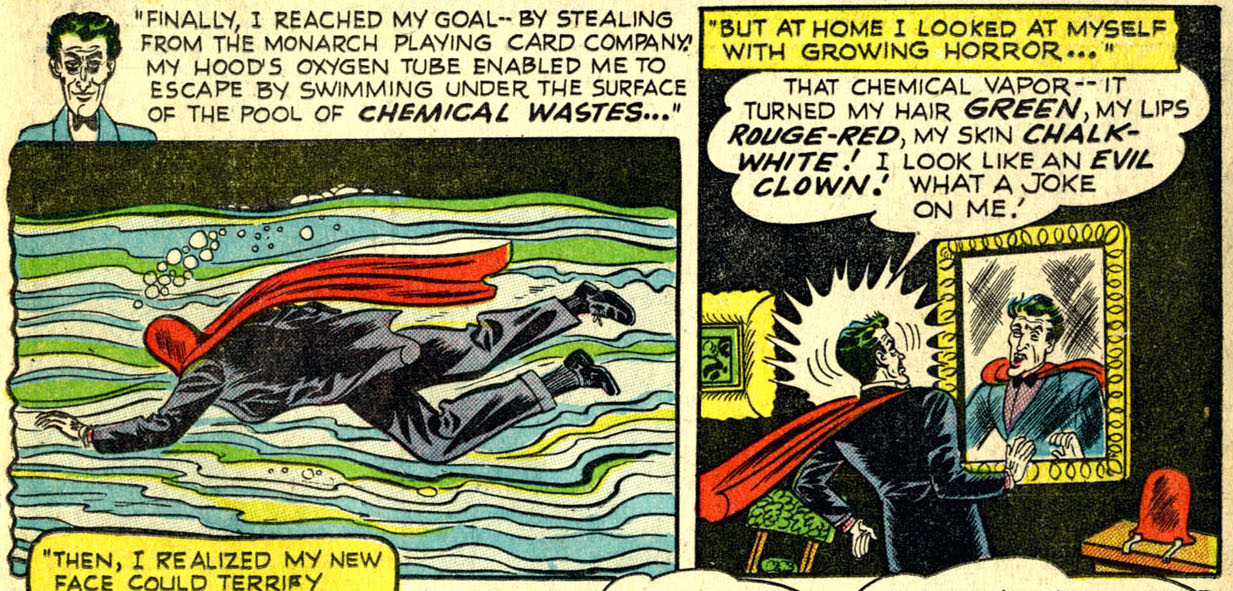 |
| Figure 994: The (rather silly) origin of the Joker. (Written by Bill Finger, art by Lew Sayre Schwartz and George Roussos, from Detective Comics #168, 1951) |
It’s a fair accusation. Unlike Watchmen, which uses superheroes as a lens to look at things like nuclear weapons and human frailty, The Killing Joke really is just about the relationship between Batman and the Joker. The sole point that it manages to make is that Batman and the Joker are mirror images of each other, a claim that requires Moore to dust off a fairly daft 1951 story called “The Man Behind the Red Hood” that offered an origin for the Joker (he was previously a criminal called the Red Hood who dove into some chemicals, came out looking like a clown, and decided to rebrand himself). Moore makes a solid effort at sprucing up the original story into something befitting the more maniacally dangerous villain of the 1980s by changing the Red Hood from a career criminal to a costume passed around a particular gang that ends up being given to a failed standup comedian who gets roped into a robbery because he’s got a baby on the way only to have his wife and child die just before the robbery is to take place. It’s overegging the custard, to say the least, although not really out of keeping with “his parents were randomly gunned down in an alley behind an opera house” as such things go. And Moore clearly knows he’s selling a pup on this one, having the Joker, most of the way into a forty-eight page comic that spends fully ten pages telling his origin, declare that he doesn’t know his own origin, and that “sometimes I remember it one way, sometimes another… if I’m going to have a past, I prefer it to be multiple choice!”, a line that in many ways further exacerbates the problem by being considerably more interesting than anything in the proposed origin story.
It’s not that the story is devoid of moments of humanity. The first scene between the failed standup comedian and his wife is reasonably evocative, simultaneously making him sympathetic down on his luck schlub and showing that he’s on edge enough that he could plausibly ever become the Joker. And the Joker’s climactic villainous rave about how “all it takes is one bad day to reduce the sanest man alive to lunacy” and accusing Batman of being just like him in this regard has some meat to it. The problem is that the underlying issues of grief and trauma that give it its weight aren’t really ones that the eternal and operatic battle between Batman and the Joker augured in the book’s opening monologue are well-suited to. The extreme behaviour that defines them isn’t anywhere close to actual human responses to even the worst of days. As Moore jokes to Stewart Lee in an interview, “I mean, your parents get killed in front of your eyes, that’s tough, you know. No one’s saying that isn’t difficult and wouldn’t be traumatic. But… a bat?”
Despite this, however, the story is a reliable classic. It won three Eisner Awards in 1989, picking up Best Graphic Album (beating the Alejandro Jodorowsky/Moebius collaboration The Incal), Best Artist (beating R. Crumb and Dave McKean), and Best Writer (beating Grant Morrison’s Animal Man). And its reputation continues: a 2014 poll on Comic Book Resources proclaimed it the third-best Batman story ever, coming in behind Frank Miller’s Dark Knight Returns and Year One, and in 2016 it got a high profile animated adaptation. In some ways, one suspects that its acclaim is part of the reason for Moore’s disdain for it. More even than Watchmen, The Killing Joke represents the influence Moore wishes he had not had in superhero comics – a cynically violent tale that is seemingly popular for that reason and none other.
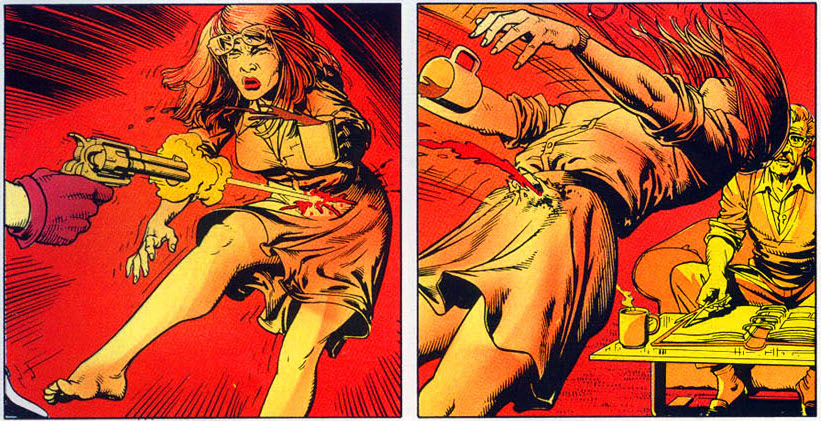 |
| Figure 995: Barbara Gordon is shot in the spine. (Written by Alan Moore, art by Brian Bolland and John Higgins, from Batman: The Killing Joke, 1988) |
Its most famous (and indeed infamous) aspect in this regard is a plot point in which the Joker shoots Barbara Gordon, formerly Batgirl, severing her spine and paralyzing her before stripping her naked and extensively photographing her. It is, to be sure, a nasty sequence. Its biggest problem is that it largely reduces Barbara Gordon to a prop within the narrative. She makes her first appearance nine panels before she’s shot, and following a one page scene in which she talks to Batman from her hospital bed makes no further appearances in the story. The result is that a character who was arguably DC’s second most famous female hero (albeit due more to Yvonne Craig’s portrayal of her in the third season of the Adam West Batman television series than to anything the company actually did) is brutally sexually assaulted for no reason other than to up the stakes of a story that’s really about Batman and the Joker.
It is of course impossible to separate this from the oft-made general critique of Moore’s work, most memorably phrased by Grant Morrison when he claimed that Moore is “obsessed with rape.” But what’s striking is in many ways how unlike Moore’s other invocations of sexual violence The Killing Joke is. Generally speaking, Moore’s use of rape is rooted in a desire to explore the genuine trauma and horror of it. It’s fair to accuse him of excessively favoring rape over other traumas and horrors, but he’s generally not inclined to treat rape and sexually assault casually. Watchmen, for instance, has a major plot point in which the Comedian rapes Sally Jupiter, the first Silk Spectre, but deals extensively with the fallout of this and with Jupiter’s reaction to this. The specifics of the plot, in which Jupiter ultimately forgives the Comedian and he ends up fathering her daughter, can reasonably be objected to on their own terms, but there’s no serious way to argue that either Sally or Laurie Jupiter are treated as props within the story. The treatment of Abby in the Arcane arc of Swamp Thing is perhaps closer to that of The Killing Joke, with Abby being killed after an issue of extended psychological torture following the revelation that her husband is in fact a zombie possessed by her dead uncle, but there’s still an absolutely harrowing issue that’s largely focused on her interiority and trauma, and Abby gets plenty of moments to shine elsewhere in Moore’s run. Barbara Gordon, on the other hand, appears in only twenty-seven panels of The Killing Joke, and is just a body to be violated in order to demonstrate that, as she puts it, the Joker is “taking it to the limit this time.”
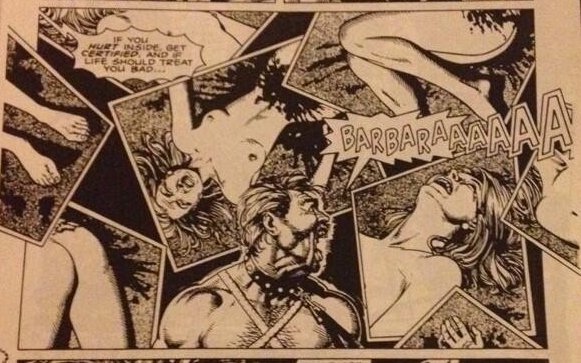 |
| Figure 996: Bolland’s initial attempt at one of The Killing Joke‘s most famous sequences. |
But Moore and Bolland’s failings still have to be understood in a larger context. The nature of this is perhaps best expressed by Moore’s account of seeking editorial approval for the decision, which came to him in the form of Len Wein saying “yeah, okay, cripple the bitch.” Moore’s note that this was, in hindsight, “probably one of the areas where they should’ve reined me in” is, to say the least, gruesome understatement. And in practice DC as a whole appears to have been slightly more ambivalent than Wein, hence Denny O’Neil’s recollection of the script sitting around unedited for a year and of him arguing to his boss that “we either run this as it is, or we give [Moore] a kill fee.” But it’s important to note that in O’Neil’s recollection, the concern was whether he “ought to edit it to make it conform with continuity niceties,” as opposed to whether it was a good idea to have Barbara Gordon shot through the spine and sexually assaulted. All in all, one gets the distinct impression that DC’s concerns were more what they could get away with than what was actually a good idea.There is no question that Moore is at fault here, and he’s made no effort to duck responsibility for it. Less discussed, however, is the extent to which Bolland took Moore’s poor idea and made it worse. The most infamous aspect is actually a bit that didn’t make it into the final comic – a version of the sequence where the Joker forces Commissioner Gordon to look at the photos he took of Barbara in which Barbara is stripped topless, her naked breasts nearly dead center in the page, an image DC unsurprisingly ordered redrawn. Speaking in 2013 after the original art emerged, Bolland claimed that he “drew what was in the script. That’s my job,” but this is in practice flatly untrue – in fact Bolland departed dramatically from Moore’s description of the panel, which called for the Joker and his henchmen to be included, and had absolutely no mention of a picture in which Barbara’s nipples are visible. Indeed, the only photo Moore specifically describes is one in which she’s “face down on the rug, cheek against the carpet and head turned towards us so that we can see that her eyes are open and that she is weeping as she stares at us.” And this isn’t the only place where Bolland opts to emphasize the sexual nature of what the Joker is doing beyond what Moore’s script called for – a panel shortly after Barbara is shot that calls for a “close up of Barbara’s head and shoulders” with the Joker unbuttoning “the very top of Barbara’s shirt” is done with considerably more distance due entirely to Bolland’s decision to give Barbara a shirt with a plunging neckline such that the top button is right in the middle of her cleavage. All of this, needless to say, rather undermines Bolland’s subsequent handwringing about “things in the story I wouldn’t have done.”
O’Neil’s recollection, however, raises an oft-discussed question about The Killing Joke, which is whether or not it was actually meant to be in continuity at all. There are good reasons to think it wasn’t – perhaps most obviously that its 1985 scripting date would mean that it came squarely in the midst of Crisis on Infinite Earths, a period where the question of what “in continuity” meant in the first place was far from clear. And the story is an odd fit for mid-80s Batman continuity, not least for the complete absence of Jason Todd’s version of Robin. Moore’s script further highlights this, noting that “as I see it, this story isn’t set in any specific time period,” and instructing Bolland to go for a “timeless and idealised version” of the character and his iconography. But realistically, one suspects that Moore was not so much trying to write an out-of-continuity story so much as he was simply not particularly concerned with the question one way or another.
Still, the transformation of Moore’s “timeless” story into a consciously in-continuity story that would leave Barbara Gordon in a wheelchair for almost a quarter-century is indicative of a larger issue in how DC’s conception of the project changed from the initial 1985 submission of the script and its eventual 1988 publication. It’s not hard to see what might have happened in 1986-87 to make DC change its strategy in marketing the project. Not only had Watchmen elevated Moore from “that hotshot British guy who did the Swamp Thing run” to “pretty much the most acclaimed comic book writer ever,” but Moore had fallen out with the company such that The Killing Joke and the rump end of V for Vendetta were the only remaining Moore material they were likely to get for the foreseeable future. Accordingly, they decided to try to get the most bang for their buck, especially with The Killing Joke.
It’s often speculated that The Killing Joke was originally intended to be published as a Batman Annual. Both Bolland and Moore dispute this, with Bolland insisting that it was always intended to be a prestige format book akin to The Dark Knight Returns. But this requires some careful unpicking, as they disagree with the claim in slightly but significantly different terms. The year-long gap in which the script sat in a desk drawer at DC is key here. When Moore wrote the script in 1985, it would not have been possible to plan it as a prestige format book for the simple reason that the term “prestige format” made its debut in February of 1986 with the first issue of The Dark Knight Returns. And while Moore and Bolland were both promising talents at DC in 1985, neither of them had the profile of Frank Miller, so it’s relatively unlikely a project from them would have been earmarked for the same format. Moore’s script is for a forty-three page comic, which is in line with what could have been published as an Annual, but as DC would have been well aware of Bolland’s slow drawing pace from the delays on Camelot 3000, it’s more likely than not that when Moore wrote the script the particulars of how it would eventually be released hadn’t been sorted out yet. In this regard, it’s notable that Moore merely denies that it was “supposed to be a Batman Annual,” whereas Bolland specifies that it was always a prestige format book. Because by the time the script was delivered to Bolland in 1986, the project existed in the wake of both The Dark Knight Returns and Watchmen, which made the prestige format, which could be kept in print perpetually and sold as a “graphic novel,” a natural choice.
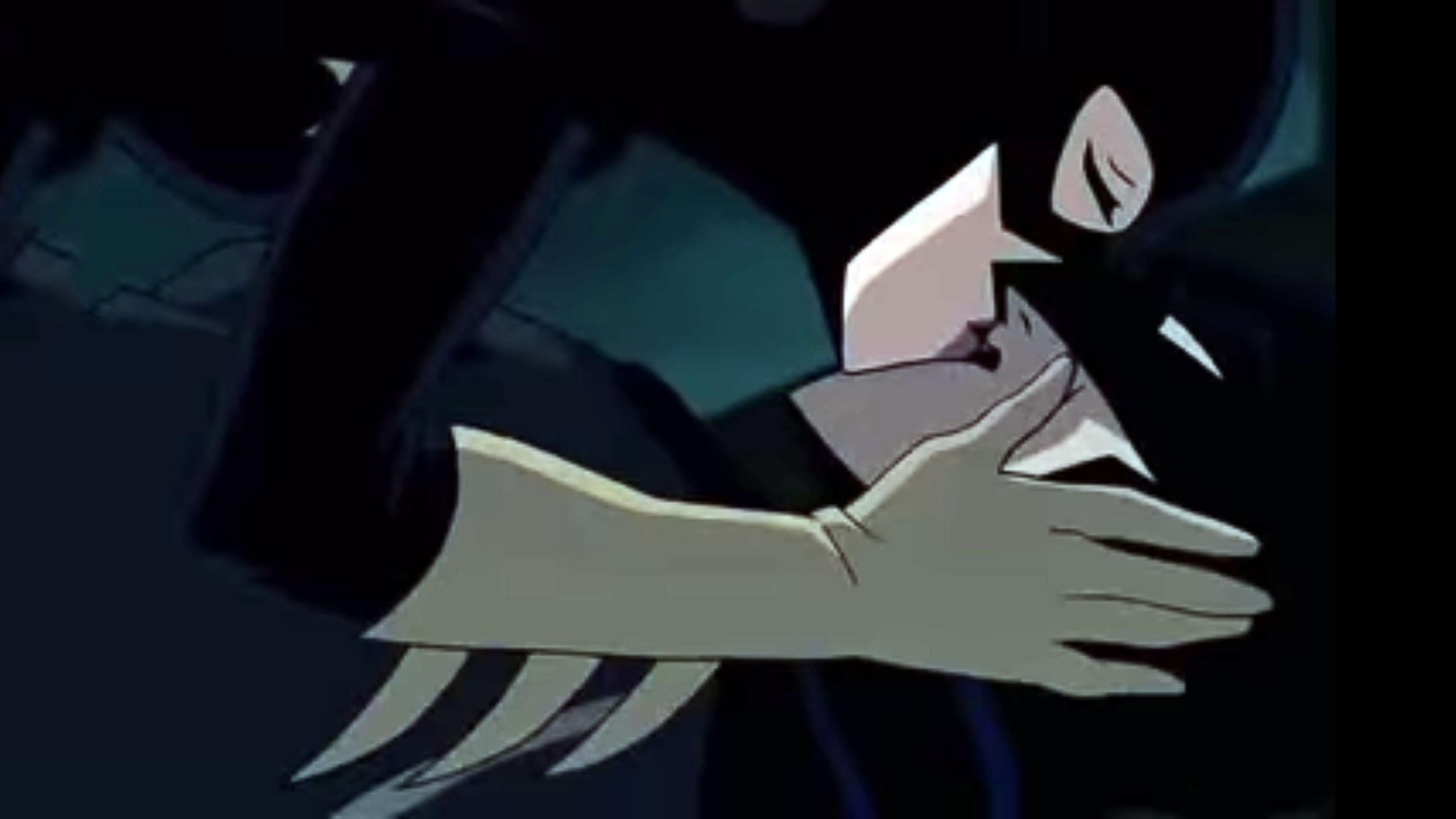 |
| Figure 997: Batman and Batgirl having sex in the Killing Joke movie. |
The grim cynicism of it all takes on a sort of fractal quality at this point. On a macro level, eventually the eternally in-print prestige book, reprinted fourteen times with varying logo colors, some changes to the Joker’s cufflinks, an exclamation point after his injunction to “smile,” and a price that steadily increased from $3.50 to $5.95, eventually proved not enough of a profit source for DC. An Absolute Edition was of course ridiculous, but a “Deluxe” hardcover edition was deemed reasonable,” and the prestige book was finally discontinued after twenty years. The story was briefly included in the DC Universe: The Stories of Alan Moore collection in 2006, but it was removed from its 2013 replacement DC Universe by Alan Moore, replaced with some of his Wildstorm work like Deathblow: Byblows, by then DCU canon in the wake of the New 52. This had the unfortunate side-effect of not only eliminating the last edition in which the story was less than thirty-seven cents a page, but the last edition to retain John Higgins’s original colors, which had been replaced in the 2008 hardcover by a new set done by Bolland that stripped the story much of the sickly lurid tone Moore emphasized in the script in favor of a flat and standard-issue superhero set. Eventually and inevitably, in part on the back of the enthusiasm of frequent Joker voice actor Mark Hamill for the project, it got an animated film with one-day theatrical release in 2016 with a script by Brian Azzarello, by this point an old hand at screwing up Alan Moore work (an important asset to DC post-Rebirth), who, in an effort to expand Batgirl’s role in the story, had her have sex with Batman shortly before the Joker’s escape, then challenged a fan who heckled him at Comic-Con about it to a fight, saying, “wanna say that again, pussy?”
Ironically, down on the micro level of DC Comics in its “the C is for Cripple the Bitch” period an almost identical process was going on. When Moore wrote the script in 1985 Barbara Gordon was a mildly defunct character, albeit unofficially so, having not made an appearance as Batgirl since 1983. Marv Wolfman and George Pérez dusted her off for a few appearances in Crisis on Infinite Earths the same year that Moore wrote the script, but for all practical purposes she was an element of Batman comics’ past. And this is largely how Moore uses her, as part and parcel of the deliberately timeless setting that included conscious references to 1950s and 1960s Batman comics and having Bolland recreate an old Bob Kane cover as a photo in the Batcave featuring not only Batgirl but a bunch of other discarded Batman supporting characters like Batwoman and Ace the Bathound.
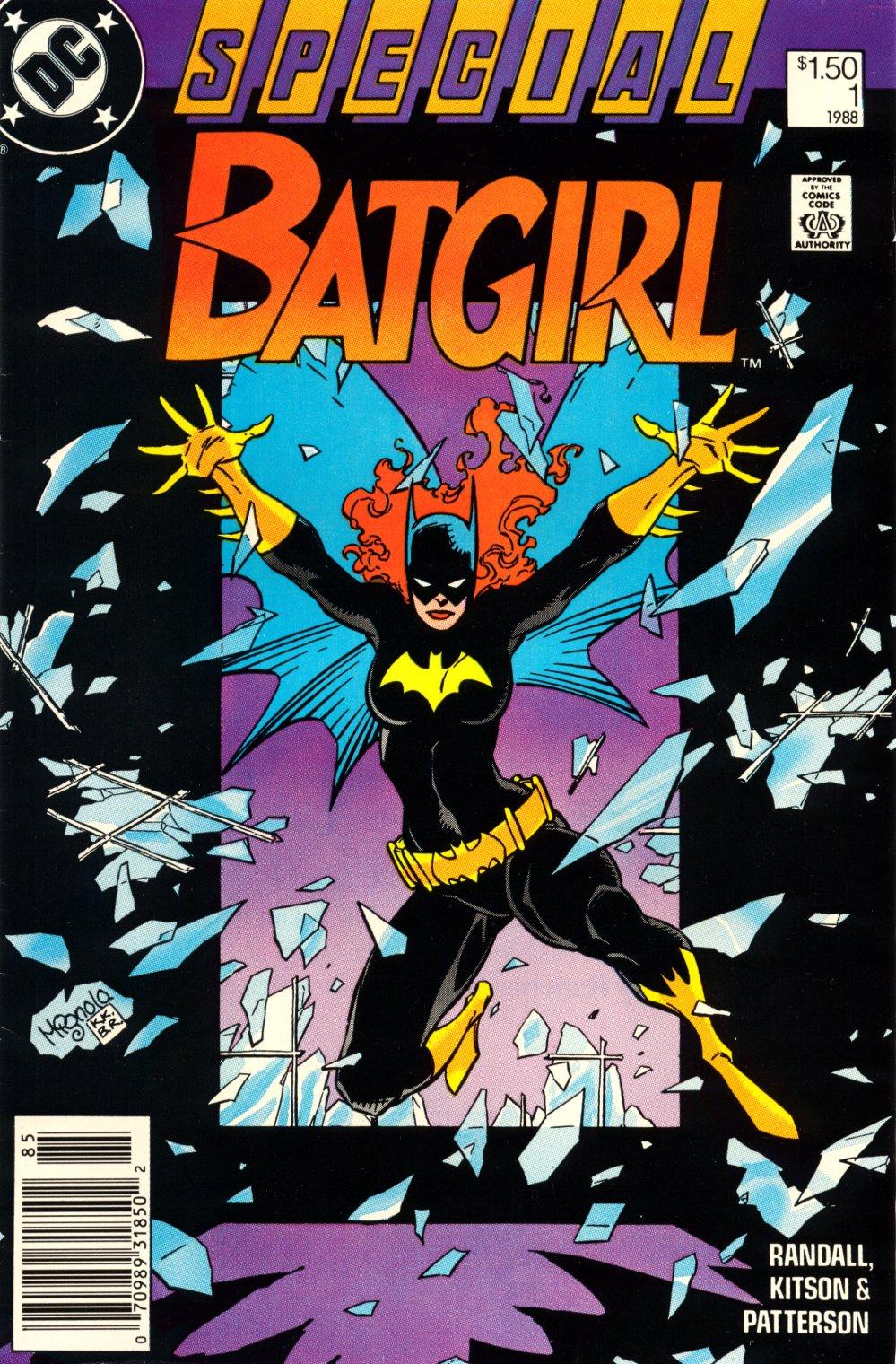 |
| Figure 998: The Batgirl Special, created to try to make people care about Barbara Gordon more than Alan Moore did. |
By the time the comic actually came out, she was in a slightly different flavor of limbo, having made no appearances since Crisis on Infinite Earths wrapped, although the post-Crisis Who’s Who Update made it clear she was still part of continuity. But in August of 1987 Watchmen editor Barbara Randall penned an origin story for her in Secret Origins, and in March of 1988, one week before The Killing Joke dropped, she wrote the forty-eight page Batgirl Special entitled “The Last Batgirl Story,” picking up on a couple of threads she’d introduced in the origin story. Neither were particularly good comics – the Batgirl Special in particular suffers from some mildly incoherent plotting, and the reasons why Batgirl decides to retire at the end of it are specious at best. But their quality is almost irrelevant in the face of the sheer cynicism of their existence. Neither, clearly, were ever written with the idea that they would be reread closely and attentively. As Randall describes her brief, “it was pretty much this simple: ‘she’s getting her spine blown out in The Killing Joke, so try to make people care.’” For her part, she was uneasy about the whole endeavor – as she hedges in a later interview, “I really admire Alan’s work, but I hated seeing Batgirl stay down,” but she made a good stab at reinventing the character for a mid-80s age, quickly knocking together a small supporting cast including a previously unknown childhood friend named Macy and the Comorant, an assassin drawn from a 1980 Detective Comics story written by Cary Burkett and drawn by Jose Delbo and Don Newton that had the entertaining hook of Batgirl having to rescue Batman.
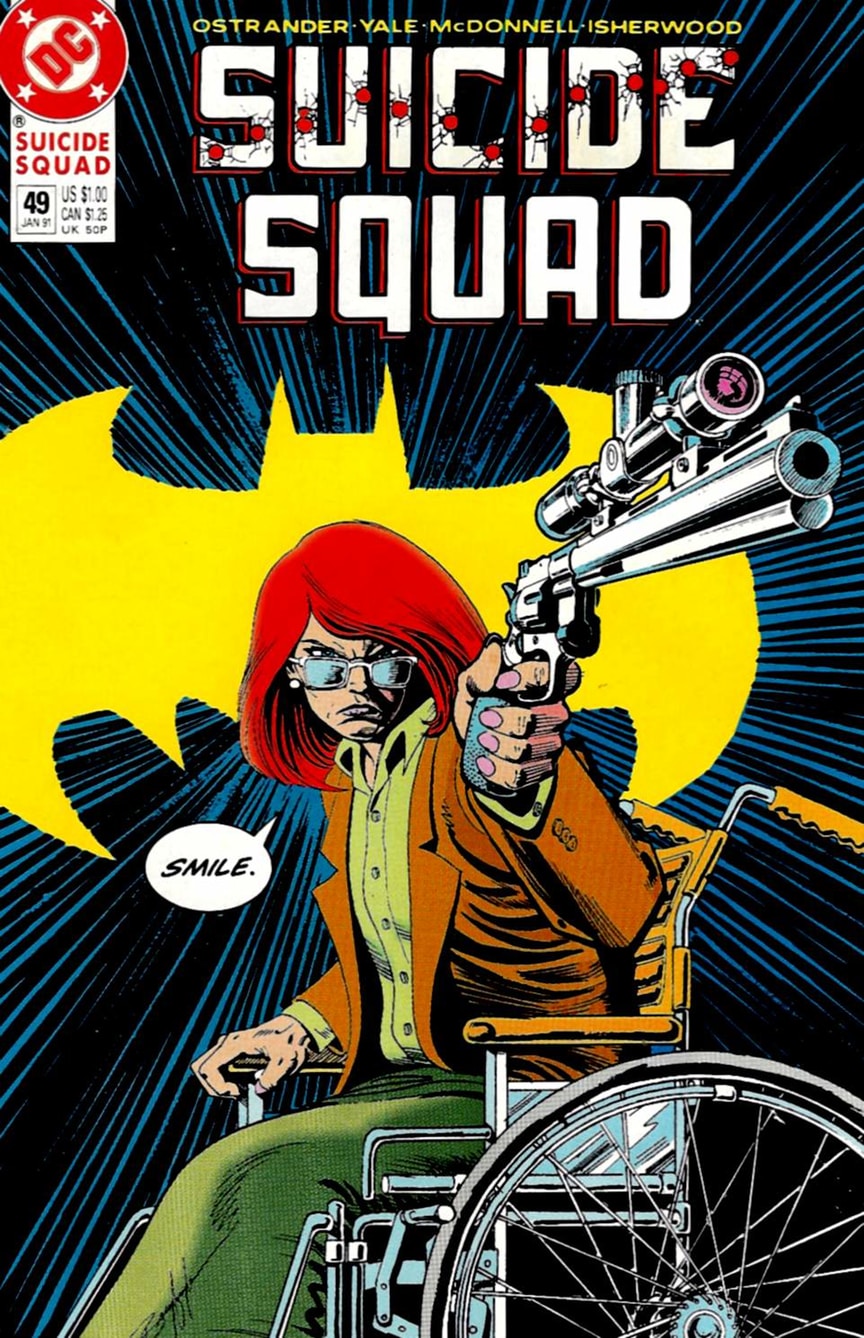 |
| Figure 999: Barbara Gordon as Oracle on the cover of Suicide Squad |
At this point in the narrative the handful of chinks of light that exist finally begin breaking through. The first comes courtesy of Randall herself, who, following the Batgirl Special, pitched a story whereby Barbara Gordon would assemble a robotic exoskeleton that would allow her to walk and fight. Initially DC looked upon this favorably, but it was ultimately rejected in favor of one from John Ostrander and his wife Kimberly Yale, who were co-writing Suicide Squad together. Both were appalled by The Killing Joke (although Ostrander stresses that he thinks Moore is, in general, “a better writer than I am, and I don’t say that about many other writers”) and its treatment of Barbara Gordon, but felt that given the horror of what happened simply undoing it would be glib. Accordingly, and picking up on some seeds sewn by Randall, they reinvented the character as Oracle, initially a shadowy adviser to Suicide Squad organizer Amanda Waller, and then finally revealed to be Barbara Gordon. This new take on the character stuck around for more than twenty years, becoming by some margin the most prominent disabled superhero in comics, and was sufficiently popular that when the 2011 New 52 reboot restored her to being Batgirl there was, wonderfully and improbably, an outcry among the exact sort of progressive fans who rightly decried Moore’s story because by this point undoing the problems of The Killing Joke was seen as less of a priority than keeping a character as unique as Oracle around. None of this was Moore’s doing, of course; still it remains a sorely needed bright side amidst the wreckage of what is, if not entirely due to his own failings, easily argued to be the single worst comic of his career.}
Once again, The Last War in Albion Volume 1 is now on sale. Your support of it helps this project remain a priority in my writing schedule.





December 16, 2016 @ 1:52 pm
Phil, one of the Watchmen Panels repeats twice within the chapter. (The ones that open the paragraphs beginning with “It is noticeable that….” and “What’s interesting, however…”). Otherwise, a fantastic issue.
December 16, 2016 @ 3:12 pm
Given that that’s an image of Rorschach, whose two appearances are between the references to the two cases of the Rorscach blot pattern being repeated, I’m guessing that’s far from accidental.
December 16, 2016 @ 3:30 pm
Nope, Sean’s right. Fixed.
December 16, 2016 @ 4:42 pm
Huh. Well, that was kind of odd.
December 16, 2016 @ 4:31 pm
A… little less in-depth than I’d imagined, but then, I can’t imagine you were ever terribly eager to cover this unfairly-but-inevitably popular nadir of Moore’s work.
As for the Watchmen connection, as of late I’ve come to think the deepest parallel isn’t with “The Abyss Gazes Also”, but the final issue. Batman, like Rorschach, is a man with certain inflexible morals (yes, yes, “Batman doesn’t kill” is something DC has waffled all over throughout the years, but Moore apparently takes it seriously, at least for the purposes of this book). And the narrative contrives to put both of them in a situation where they can’t follow one moral without breaking another: kill the Joker OR let Barbara go unavenged/start World War III OR let twelve million lives go unavenged.
Poor Rorschach at least had Jon to mercy-kill him out of that situation. But Batman, far too popular for DC to even consider that, has no options aside from cradling the worst man he’s ever known and laughing his guts out.
December 16, 2016 @ 4:39 pm
“But Batman, far too popular for DC to even consider that, has no options aside from cradling the worst man he’s ever known and laughing his guts out.”
No options unless you consider Morrison’s interpretation.
December 16, 2016 @ 4:52 pm
Which I tried and failed to figure out a way to work in, to my mild surprise. I probably should have given it a parenthetical somewhere though. Ah well.
December 16, 2016 @ 8:51 pm
I was a little surprised you didn’t include it, but it fits the overall shape of the Killing Joke part (or at least my perception of that shape), which mostly bypasses Batman/Joker and zeroes in on Barbara – thereby avoiding the mistake that Moore made in the comic. I really like that.
December 18, 2016 @ 2:08 pm
Yep I really appreciated the fact that a lot of the focus was on the treatment of Barbara.
December 16, 2016 @ 4:55 pm
Yeah, I poked at it a bit and finally concluded that there just wasn’t much to do with Killing Joke beyond diagnose the precise historical nature of its awfulness. The fact that it just gets worse the deeper you dig really makes it hard to escape the gravity of the multi-party fuckup involved.
(Just wait til you see the ridiculously narrow angle I’ll be taking on the movie.)
December 16, 2016 @ 5:05 pm
Presuming it’s the one you brought up in the podcast with Sam, I don’t think it would work given… recent political developments. It’d still be funny as hell, but not as funny as it would be under a presidency that doesn’t believe him.
Also I presume all the invocations of Morrison in the article were meant to build up to the “Morrison’s theory on the Killing Joke” bit that shockingly never appeared? Or is there something I missed in my last reading of Watchmen (which was, roughly, four years ago).
December 16, 2016 @ 5:13 pm
I think what it loses in absurd humor it gains in on-pointness.
And no, they were just there because Morrison’s perspective was relevant in those bits. These are the two bits of Moore’s 80s work Morrison is most right about. I don’t think Morrison’s Killing Joke theory is that interesting, tbh. It’s clever, but nothing really follows from it.
December 16, 2016 @ 6:13 pm
Speaking of Morrison… I’ve found that one of the more entertaining subtexts to read The Killing Joke with is that it’s really about the Joker trying to get Batman to understand they’re both fictional characters, who have no hope of ever achieving peace so long as DC can squeeze another nickel out of their war. Surely it’s not coincidence that when Batman starts laughing on the finale page, he’s directly facing the fourth wall?
I was rather surprised and mildly dismayed when told Morrison had already covered this territory with numerous superheroes…
December 17, 2016 @ 3:43 pm
it’s really about the Joker trying to get Batman to understand they’re both fictional characters, who have no hope of ever achieving peace so long as DC can squeeze another nickel out of their war.
Whoever came up with that, I want to seahorse their babies. It fits with my belief (see link) that the Joker’s psychosis is fourth-wall awareness.
And, on the subject of wrong-headed reviews from the right or alt-right, Debbie Schlussel spewed out an amazingly blinkered review of the movie, in which (among other things) she demonstrated that she doesn’t understand alternate history even when it’s explained to her slowly, carefully, and with great attention to the considerable detail involved.
December 17, 2016 @ 12:08 am
The most devastating critique I’ve seen of The Killing Joke was a scene in a 2000-and-something anthology book that did an Origin of Oracle. In the opening scene, Bruce is visiting Babs in hospital (in costume) and she says “They tell me that when you caught him you were both laughing at some private joke. Was it me?”
December 19, 2016 @ 4:48 pm
That’s “Oracle: Year One” in Batman Chronicles #5, for those who are interested: http://www.comics.org/issue/95171/
Also by Ostrander and Yale.
December 17, 2016 @ 1:12 am
I always thought Grant Morrison’s interpretation of the Killing Joke was obvious, and that everyone interpreted it that way and after the Joker died there was some comic I hadn’t read where he got resurrected or cloned or his cousin Alouicious took over or something. When I first read the comic, that’s what I thought, and I thought that for years.
Little did I know that not only wan’t the case. In fact, I only learned that when I read an article about how it was “Grant Morrison’s Opinion.” So it still sort of… baffles me that it isn’t it? Cause I try to see it not that way and it I just… Don’t.
Of course, my seclusion from comics culture certainly helped with this, as did reading only the comics my library had since I couldn’t afford them, and having no one to discuss them with before the internet came into my home.
December 18, 2016 @ 3:04 pm
Great to see the War back Phil and I have just spent a grey Sunday afternoon pouring over and enjoying the chapter. So thanks, it’s been worth the wait!
I hadn’t really made a sympathetic connection with Rorschach as a character when I first read it, in fact I had felt him to be fundamentally wrong. So yes, great point at the end of his section where you say he is “the only person in the comic not to look down and whisper no”. It’s been so long since I read it and I had plain forgot his sympathetic stance at the end.
December 18, 2016 @ 4:59 pm
What do you think is the significance of Rorschach tearing off his mask right before Doctor Manhatten kills him? Given how much the previous story said that Rorschach considered the mask to be his true face, the fact that he faces his final moment without it suggest to me that Kovacs re-asserted himself in the end.
December 20, 2016 @ 8:46 pm
Great analysis, but I’d quibble a little with this point:
“When the truth is simpler, at once beautiful and in its own way more terrifying: he is not a figure of Severity, but of Mercy.”
I don’t think it’s clear that much mercy is at play in those last scenes. Rorschach is not actually trying to do something that will help prevent any future suffering (he can’t save the people that have already died, and Ozymandias has no further plan to kill anyone else), he mainly just seems to want to enforce his ideal of justice against Ozymandias (‘Evil must be punished. People must be told’). And my interpretation would be that he does so fully recognizing that if he succeeds in exposing Ozymandias, he may well doom the rest of the world to death in nuclear war (when Dan says ‘This is too big to be hard-assed about! We have to compromise…’ Rorschach responds ‘No. Not even in the face of armageddon.’) It may be true that he is not motivated purely by his principles but also out of compassion for all the people that have died (he does occasionally show moments of compassion, as in the scene with his landlady that you mentioned), but I don’t think there’s any strong indication that this is the case, and if anyone were to have asked him I’d imagine him saying it was purely a matter of his principles, not his feelings.
Another point about Rorschach’s inconsistency, especially with regards to his final scenes: in the files on Walter Kovacs that appear at the end of “The Abyss Gazes Also”, there’s a childhood essay he wrote about his parents which shows his fantasy that his father was “some sort of aide to President Truman”, and it includes a significant passage at the end: “I like President Truman, the way Dad would of wanted me to. He dropped the atom bomb on Japan and saved millions of lives because if he hadn’t of, then there would of been a lot more war than there was and more people would have been killed. I think it was a good thing to drop the atomic bomb on Japan.” Presumably Moore intended this to be a close parallel with what Ozymandias did, killing millions of innocents to save billions. And this can’t just be too easily dismissed as Rorschach’s childhood moral views differing from his adult ones, since we see that line “they could have followed in the footsteps of good men like my father or President Truman” in the adult Rorschach’s opening monologue, suggesting he still considers Truman to be a personal hero and presumably doesn’t mind Truman giving an order that he knew would kill huge numbers of Japanese civilians for the sake of ending the war.
December 21, 2016 @ 9:27 am
Somehwat on topic, Catherynne M. Valente just announced The Refrigerator Monologues – a book about the treatment of superheroines. Is anyone else excited?
http://www.themarysue.com/the-refrigerator-strikes-back-the-refrigerator-monologues/
December 21, 2016 @ 1:50 pm
Wouldn’t this be the place to bring in at least a brief discussion of Frank Miller? I mean, for good or bad, “Watchmen” will always be paired with “The Dark Knight Returns” as the big-name breakout comics of the 1980s. And, of course, Moore was very familiar with Miller’s work, and is to some extend responding to it — he makes an oblique reference to DKR early on (“You’ll kill me… or I’ll kill you”) and then of course there’s the final fight in a funhouse.
Doug M.
December 22, 2016 @ 4:29 pm
“Rorschach sighed as he drew his katana…”
There’s almost certainly an entire essay or book to be written about performative calmness, casualness, and perceived authority…